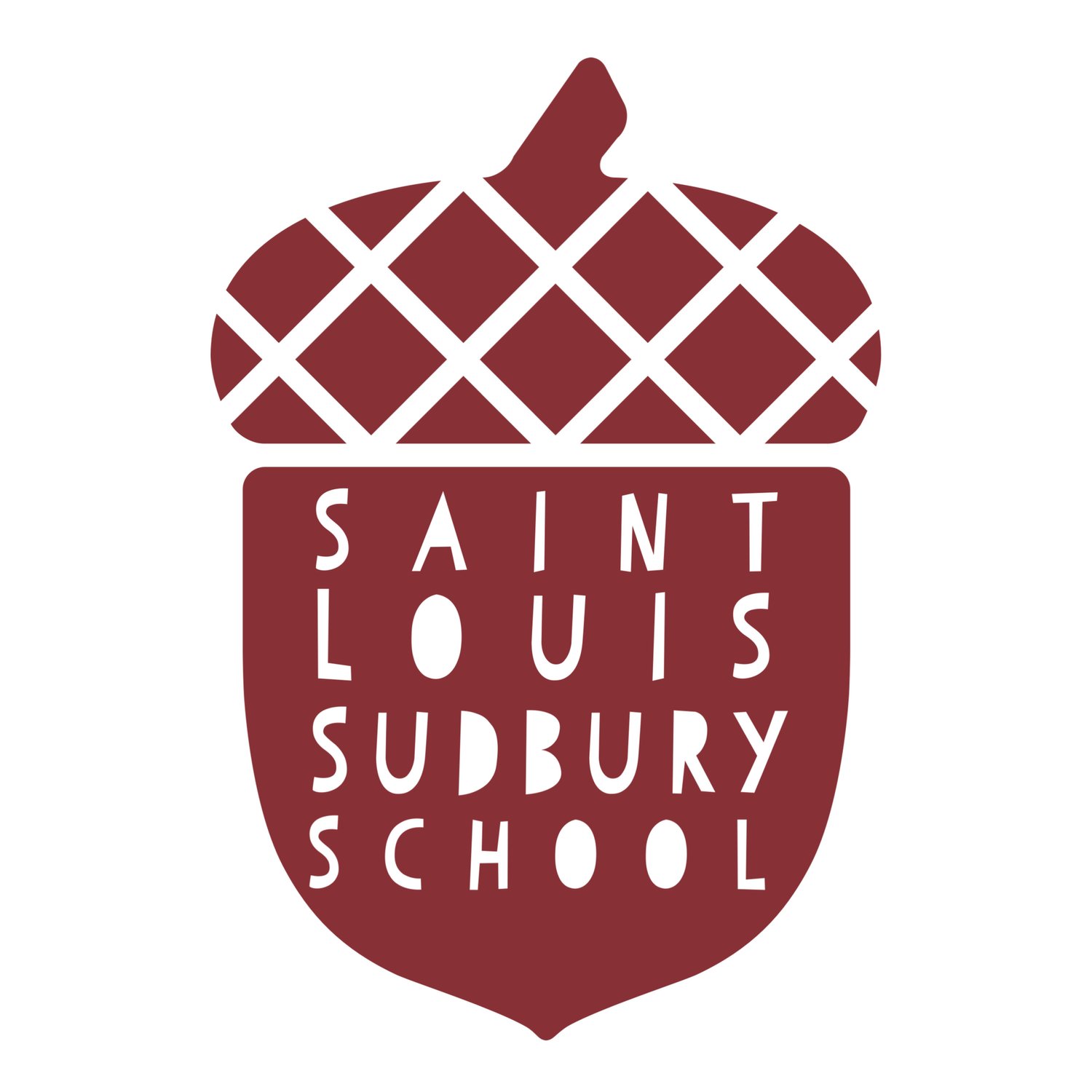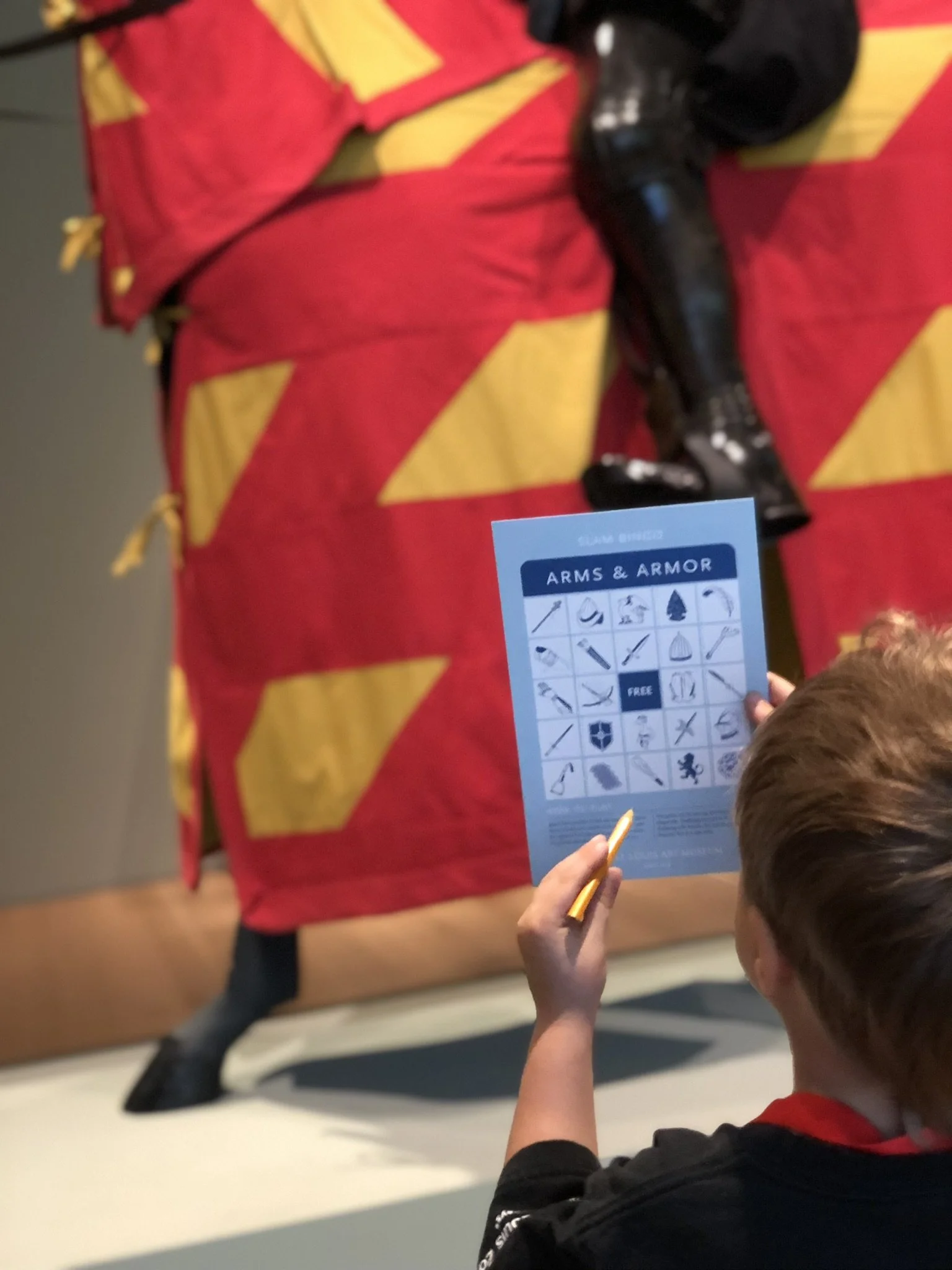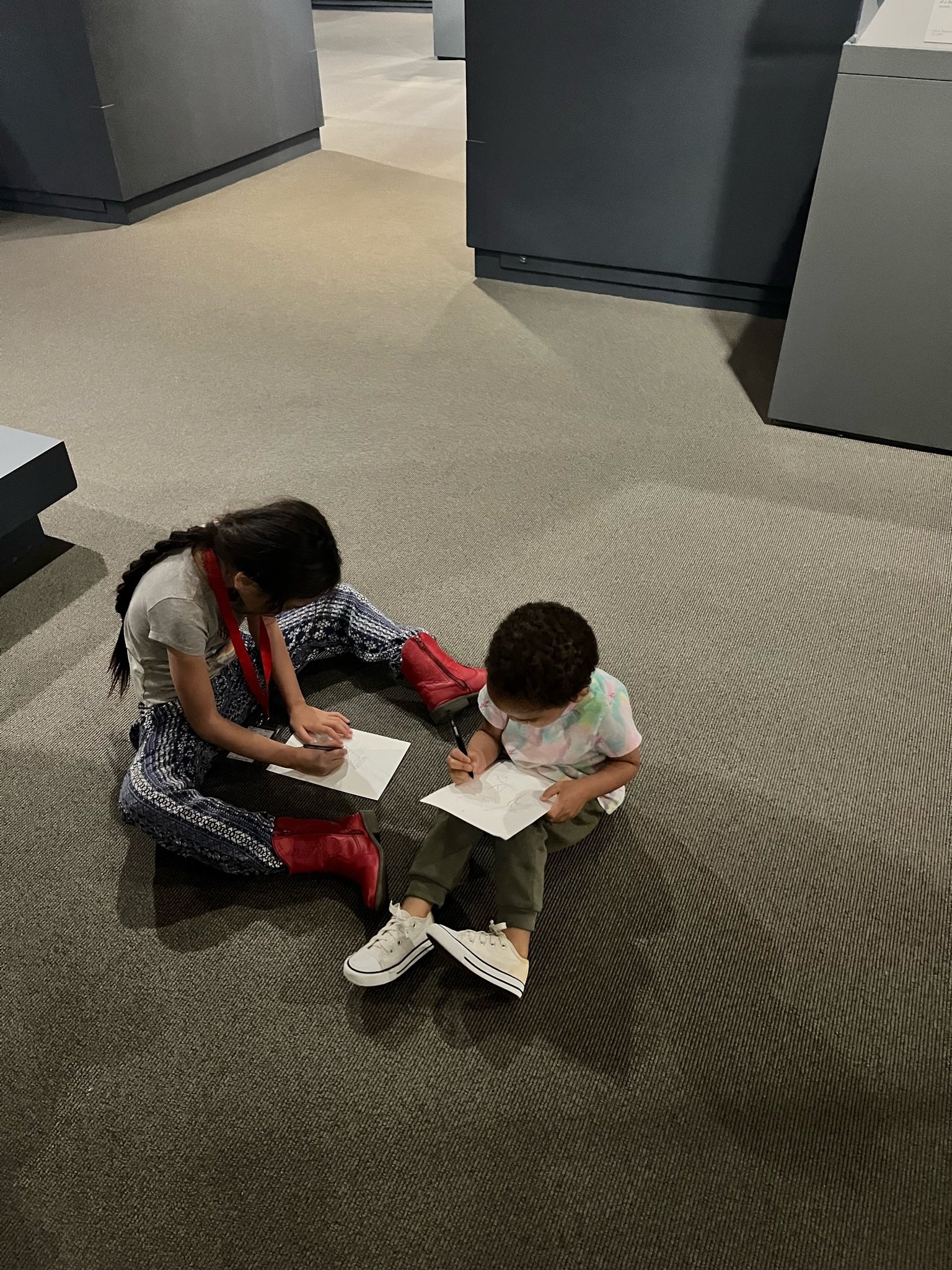We are excited to announce that Britni Wige has returned to the Saint Louis Sudbury School Board of Directors! We asked Britni some questions about her views of the Sudbury school model and her hopes for our school’s future.
Can you tell us about your involvement with Saint Louis Sudbury School?
I've been involved with the school since it's been in the planning period, before the school was even incorporated. It's been such a wild ride full of ups and downs, so much growth and transformation, and an incredibly fulfilling opportunity. To see an idea come to life, to experience the highs and lows... it's been the ultimate test of something we always tell parents, to trust the process. Building and running a microschool, especially a Sudbury model school is much like what the students experience in their time attending the school. It's a time of practice, figuring out what works and what doesn't work, and learning to work and grow together with the many different personalities, experiences, and life perspectives that everyone brings to the table. It's the ultimate way to truly understand and put into practice what it means to balance individuality and community. And it means leaving one's ego at the door.
What do you like about the Sudbury model?
I love that the Sudbury model embodies the true meaning of trusting kids to learn, grow, and become who it is they truly are. I love that it's not about the parents and what they envision for their kids, that the kids have the freedom, respect, and autonomy to figure out who they are, what their expectations are for themselves, and what they are passionate about, and knowing they are unequivocally free to change at any point in time. The Sudbury model supports individual and group learning and community development. It's set up in a way kids can practice learning and living in the real world, but in a space that is safe to make mistakes and to learn from them. The students know their voices, their opinions, and their thoughts and ideas are heard, respected, and honored. The Sudbury model is set up in a way to gives kids daily opportunities to practice finding their voice, learn, and grow within an environment that models a high degree of self-awareness and emotional intelligence and gives kids the tools and skills they need to practice open, honest, and courageous communication. They learn how to communicate, debate, and have respectful discourse, and they learn how to ask for what they want and advocate for themselves while also having an abundance of time to learn what they want to learn in a way that works best for them. Sudbury schools rely on local connections and resources which means the students have the unique opportunity to learn from those actually doing what they want to do or are currently interested in. Sudbury students can engage in apprenticeships and internships much sooner than those attending standardized schools thus not having to waste time before gaining the skills they need to enter the workforce and landing that job or entering the career they dream of.
Students practice Self-Directed Education at Sudbury. Why do you think this approach (instead of coercive curriculum) is relevant in today's world?
Our world is changing at a rapid pace. No one knows how the world will be 10-20 years from now. We do know, based on what has happened in just the last 5 years, that the work environment and the way we interact with the world and those around us, will most likely be very different. To teach from a curriculum that is based on how the world works 20 years ago (or more) is doing a massive disservice to future generations. Self-Directed Education gives kids the opportunity to hone in on what they are interested in now, using the tools and resources that are current, to dive into those passions for however long they have them, and while doing that they are learning all the subjects they would cover in standardized school. The difference is that kids are learning at their pace, in their own way, and in a way where they own that information, that knowledge. When you teach a child how to do something, you forever take away their opportunity to learn it on their own. And they don't own that experience. To force a child to learn in a linear fashion or by subject with tests and grades, presentations, and projects they don't initiate is to slowly chip away at the child's inner knowing that they have the ability to learn and the confidence to gain what they need to thrive. They are robbed of the opportunity to develop the confidence and fortitude of coming to their own conclusions and forming their own ideals, thoughts, and results. And they grow up with shame, blame, and guilt for not living up to the expectations of the adults around them. Practicing Self- Directed Education means the student learns who they are, embody their own learning, and do so at the pace and desire that feels best to them. The learning is automatic, natural, and authentic to who they truly are.
What are some challenges Sudbury model schools face?
We are so conditioned as a society to believe conventional education is the only way and any other way means the person can't succeed in the "real world." There's still so much shame and judgment around someone getting their GED or HiSET. To me, the biggest challenge is getting parents to trust the process, not to fear boredom, and to understand their kids don't have to learn a specific way or have to be sitting down with a teacher to learn and be successful as a young adult. That actually, by embracing Self-Directed Education, the adults set the kids up with the opportunity to be thriving and successful right out of the gate and they lessen the chance of the child having to heal from not knowing who they really are or what they want to do with their life. Sudbury students gain the confidence and independence way earlier than their peers in standardized schools because they are free to figure out what freedom, passions, interests, and success mean to them. Most adults weren't given that opportunity and that can bring up some big feelings and tons of doubt.
Another big challenge is FOMO (Fear Of Missing Out). And most of the time this comes from the parents projecting onto their kids. They feel certain events or experiences kids endure in conventional school is something they will miss out on if they attend a Sudbury school. That the events and experiences are a "right of passage" for teens and without them, they will somehow miss out or not be normal. What's great about Sudbury schools is if the kids want certain events or experiences, they get to make them happen, such as school dances, sports events, competitions, concerts, and fundraising or working with the community. All is possible at Sudbury schools and I dare say, they can do it better because the kids are leading. The pressure to conform isn't there. The pressure to live up to others' expectations or fear of ridicule and embarrassment or worse isn't there. They don't have to miss out on anything, they get to experience so much more and it's all on their terms.
What are your hopes for the future of Saint Louis Sudbury School?
I see so much potential for the school. The current staff and volunteers know what the Sudbury model is and they model it in their own lives which sets the school up for a great future. They are dedicated to the Sudbury philosophy and are passionate about their own personal growth and transformation; all super necessary for a thriving Sudbury school.
My hopes are:
Continued Growth and Evolution: I am excited to see the school continue to change based on the needs and interests of the students and the relationships they develop with the local community. The dynamics and energy of the school change with each new student, and every day is different.
A Wider Acceptance of the Sudbury Model: I look forward to helping more parents and society as a whole recognize the value of Self-Directed Education and the relevance of Sudbury Schools in preparing students for a rapidly changing world.
Empowerment and Autonomy for Students: I look forward to helping the students and adults feel empowered and autonomous and able to pursue their interests and passions freely while developing their individuality and being a part of a supportive community.
Stronger Community Ties and Partnerships: I look forward to the school forging stronger connections with local businesses and organizations. Sudbury schools have the unique ability to provide students with opportunities that give them real-world learning experiences that they get to participate in during school hours. These partnerships are spearheaded by the students which means the students learn how to talk to adults, ask for the opportunity to learn from them, and learn how to engage with the world around them.
Enhanced Emotional Intelligence and Communication Skills: Now more than ever we need more people who have a firm understanding of emotional intelligence and a daily practice of healthy communication. We don't live in a vacuum and the online space has a way of keeping us in echo chambers, chipping away at our ability to communicate effectively with love and compassion for those who think, live, and operate differently. This world so desperately needs more people who can engage in respectful discourse and who are dedicated to acknowledging their own projections and who have the self awareness to know when they are projecting onto others. The Sudbury model is set up to foster emotional intelligence and healthy communication skills. These are two skills that will prove to be incredibly vital in years to come. The current staff and board members hold these values and skills to such a high degree, I look forward to seeing the results of such life changing work.
Overcoming Societal Stereotypes and Biases: I look forward to working on overcoming the societal challenges Sudbury schools encounter and helping to change the perceptions about alternative education models, getting GEDS, and pursuing a life and career based on one's true passions and talents and not on what society deems correct or right.
Creating a Model for Future Schools: I am super excited and looking forward to Saint Louis Sudbury School being a model and inspiration for future schools. I look forward in the years to come to show the success and effectiveness of a Self-Directed, democratic education that is built around the freedom of the students both individually and as a whole.
Inclusivity and Diversity: One of my favorite parts about Saint Louis Sudbury School is how inclusive and diverse the school is, from the staff, volunteers, and board members, to the whole student body. I am so excited to watch the school grow and for the kids to learn from each other, and their own uniqueness, and to thrive in a community that is rooted in respect, compassion, and authenticity.
Sustainability and Self-Sufficiency: As a Founding board member and the Tuition Clerk, I am looking forward to the school becoming sustainable and self-sufficient. I would love for us to be able to offer many full scholarships a year, to help as many families as possible through our Tuition Assistance Program, and to have the grants and donations we need to make it all happen. I look forward to partnering with local organizations and individual donors to help bring in the funding we need to keep Saint Louis Sudbury School affordable for all.
Sudbury on the LiberatED Podcast
Listen to an interview with Saint Louis Sudbury School staff members Phoebe Love and Jennifer Lin on Kerry McDonald's LiberatED Podcast! We talk about how we got interested in self-directed education, the Sudbury model, challenges, our outlook for the future, and more. Kerry's podcast features engaging conversations with the innovators creating education options for families and learners outside the conventional classroom. Saint Louis Sudbury School was honored to be featured on the series!
Kerry McDonald is a Senior Fellow at the Foundation for Economic Education and author of Unschooled: Raising Curious, Well-Educated Children Outside the Conventional Classroom (Chicago Review Press, 2019). She is also the Velinda Jonson Family Education Fellow at State Policy Network, an adjunct scholar at the Cato Institute, and a regular Forbes contributor.
Kerry’s research interests include homeschooling and schooling alternatives, self-directed learning, education entrepreneurship, parent empowerment, school choice, and family and child policy. Her articles have appeared at The Wall Street Journal, The New York Post, Newsweek, NPR, Education Next, Reason Magazine, Washington Examiner, City Journal, Entrepreneur, and the Journal of School Choice, among others. She has a master’s degree in education policy from Harvard University and a bachelor’s degree in economics from Bowdoin College.
VELA Education Fund Grant
We are so excited to announce that Saint Louis Sudbury School has been awarded a VELA Education Fund Micro Grant! The majority of the $10,000 grant will go towards Sudbury's Tuition Assistance Program for newly enrolled students. Over half of our current students receive tuition assistance. Accessibility has always been a priority for our school as we feel that all young people should have an opportunity to discover who they are in an accepting and creative environment and experience the benefits of Self-Directed Education in a democratic community.
Also, a portion of the grant funds will support Sudbury student enrichment activities and marketing of our school (the latter being something we haven't been able to allocate much money to in the past). We are enormously grateful to the VELA Education Fund for their generosity.
VELA Education Fund invests in people who build custom solutions to meet children's needs; increase the reach of education models that redefine how, when, and where learning takes place; and make it easier for families to access options that best reflect their values.
If you are interested in having your child apply to become a new student at Saint Louis Sudbury School or know of families who may be interested, please contact us at info@stlsudbury.org. We are enrolling year round and are happy to be able to offer additional tuition assistance funding for new students in the coming months because of the VELA Education Fund grant!
Interview with a Staff Member
A Saint Louis Sudbury School student volunteered to come up with questions to ask Phoebe Love, a staff and board member. Phoebe talks about what she likes at Sudbury, how students learn, the Sudbury model, the school environment, and more.
What is your favorite thing about Sudbury?
At the moment I like not knowing what to expect. Who could expect, for instance, that you would want to help me revise the enrollment contract? Or that the student board would want to organize a school dance? Or that a bird would fly into the building and spend the night in the library?
Do you think Sudbury is a positive environment for the students and staff?
Yes. We are nice to each other, and when we aren’t we fix it.
Why do you think Sudbury works?
Because we want it to work. The flexibility of the structure and the size of the school means that when we see something isn’t working, we can figure out why and try something new.
Do you think kids at Sudbury are learning?
Definitely. Sometimes they learn things that they didn’t expect to learn, and I don’t mean information. Information is easily had, especially with the internet now, but here they — you — are learning how to work with others, whether it’s getting a bird out of the building, figuring out how to say someone is doing something that is bothering you without being mean about it, arguing for the right to bring in a whittling knife, or interviewing a staff member because a board member requested it for the blog.
Do you like the Sudbury model?
Yes, as I interpret it! When I first got here, I was interpreting it in a way that was too restrictive for adults, where we were supposed to be helpers IF someone asked for our help, or just doing our own thing, so that the kids could watch us doing it and get sucked in, or not. Both of which are fine, but to restrict it to that is practically a “Don’t speak unless spoken to” edict, which is unnatural and depressing. I was pretty much violating it, then feeling guilty and retreating into a shell, and now I’m just me, and if I’m being too pushy or bossy you can give me a talking-to, and we’ll figure it out. There has been a recent precedent for that, with students/staff, which I hope was a positive experience overall, even if it was uncomfortable in the moment.
Do you think we need more students to keep Sudbury going? If yes, how many more?
We definitely need more students, and I hope the flyer you designed yesterday sucks them in! How many more? At this location I would like maybe twenty more.
Do you think Sudbury is a good place to enroll at?
Yes, although it might not be for everyone. What we want to do is create an atmosphere where, if you are thinking it’s not for you, you could say something, and we could figure it out together, and make it work. The students have a lot of power here, individually and collectively, and that can be bewildering to some, especially if they came straight from a school where they were told what to do every second of the day. Conventional school promises success in the world if you obey all instructions (inaccurately, we believe), and it takes a scary leap of faith to chart your own course, even if you have a group of people to help you with it.
Field Trips
In our twice weekly School Meetings, Saint Louis Sudbury School students can propose and vote to go on field trips! Here are some photos of recent visits to area parks and the Saint Louis Art Museum.
We are mindful of keeping costs low for field trips and try not to ask families to pay any additional field trip costs. Sudbury loves the many free and amazing activities in St. Louis!
Also, because our school does not own a bus or van; since the majority of Sudbury parents all work full time; and we have a good number of regular volunteers; generally, we do not ask parents to chaperone and/or act as carpool drivers for the field trip (although parents are welcome to attend if permitted by members of School Meeting).
On field trip days, we ask parents to do one morning drop off and one regular afternoon pick-up at the designated field trip location. Some students love the experience of being in a different place for the whole day, while others… not so much. But this ebb and flow of doing things that feel right and at times, feels not so right, is a great example of how Sudbury students adapt and respect the members of the Sudbury community. In the end, pretty much everyone finds something that they enjoyed about the day out!
School Meeting members are in the process of planning shorter field trips that not all students have to attend. More to come.
Games at Sudbury
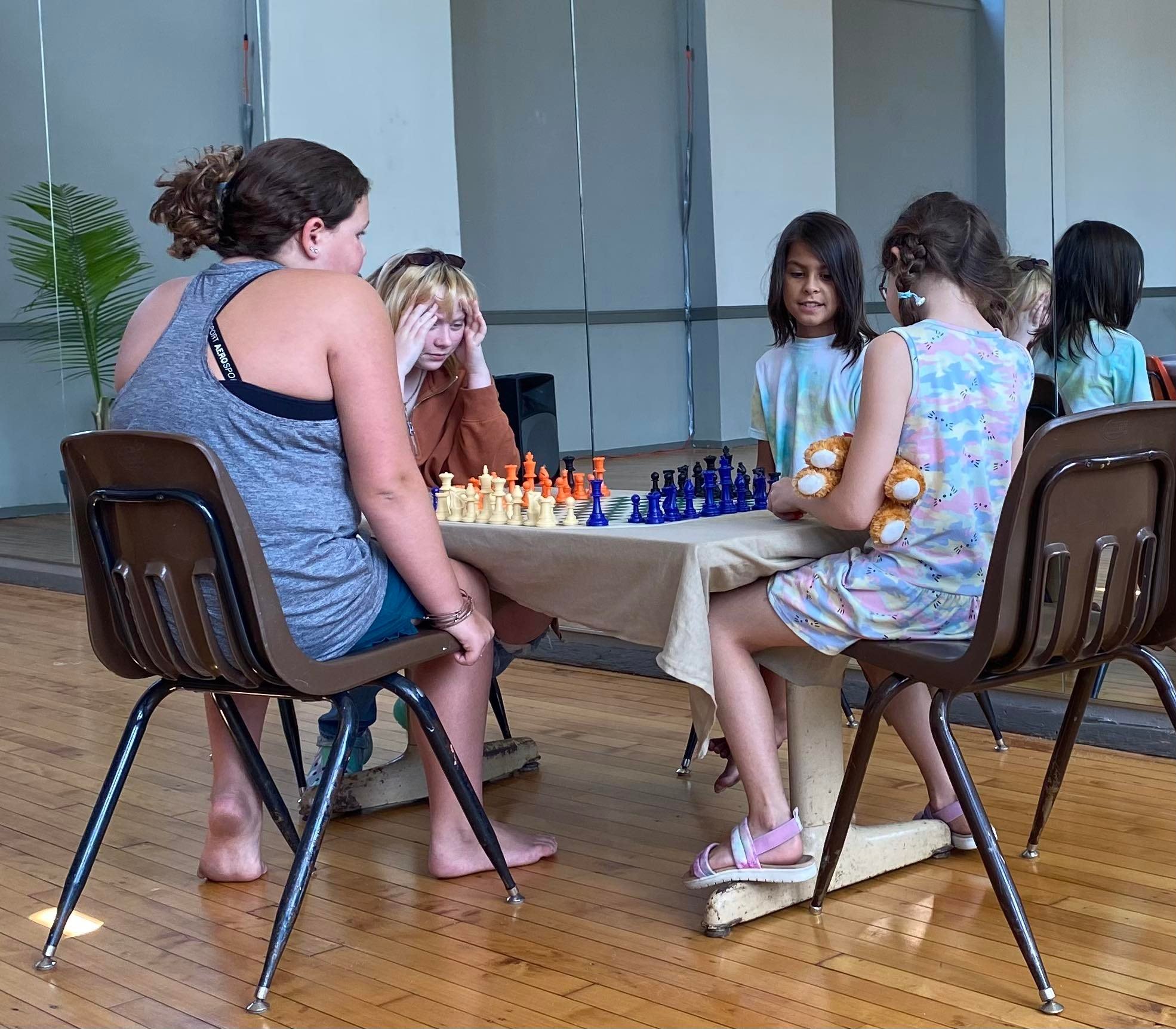
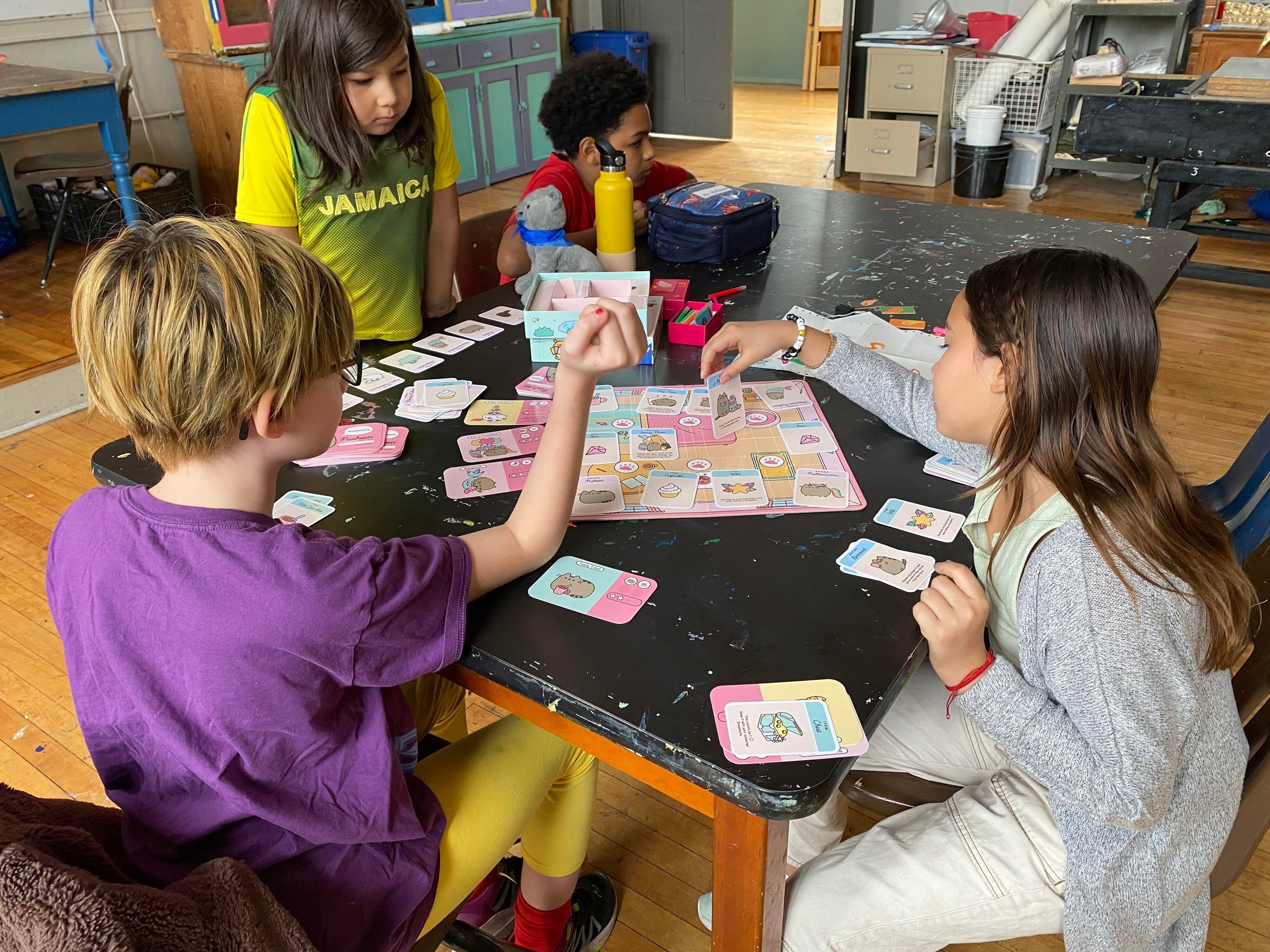
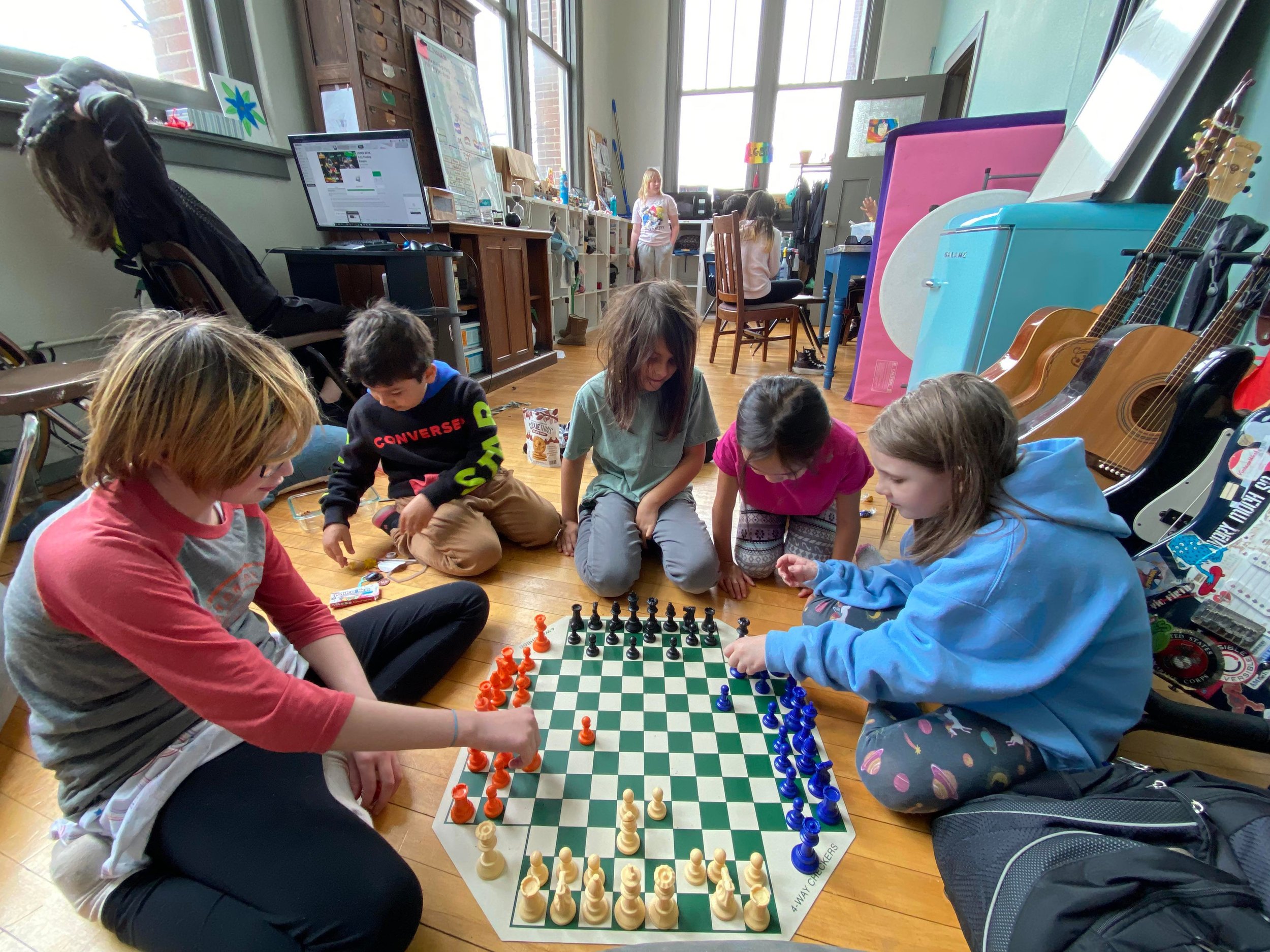
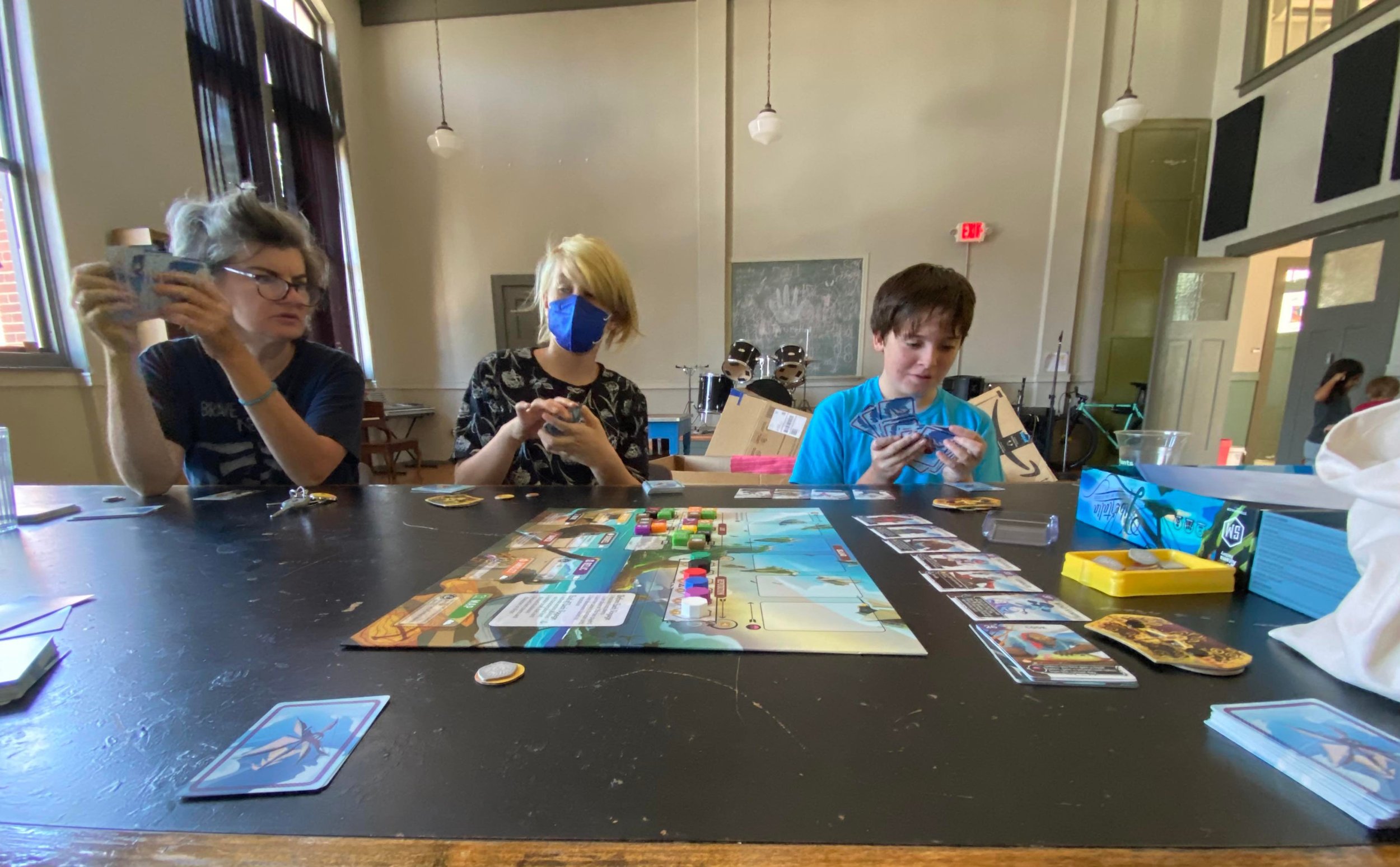
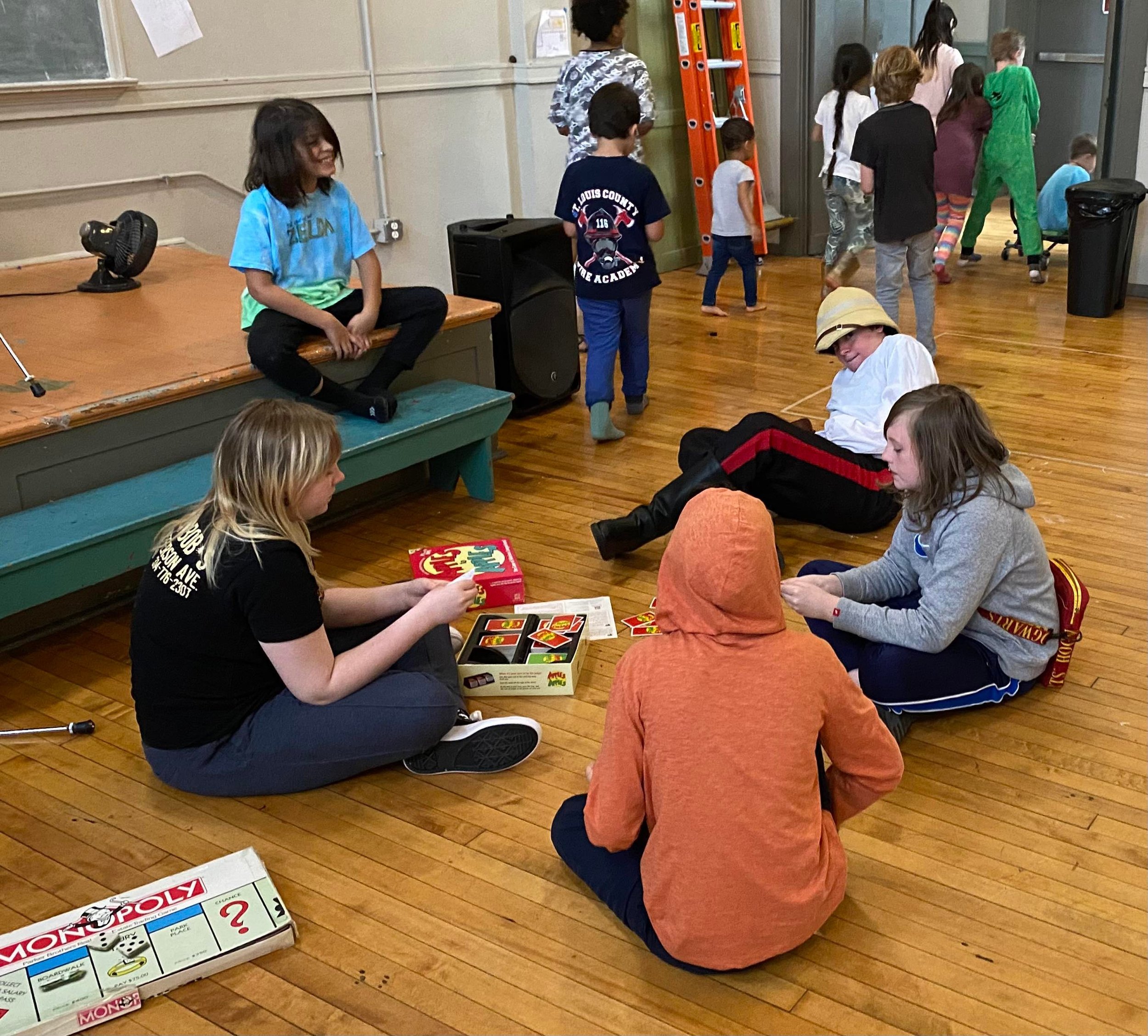
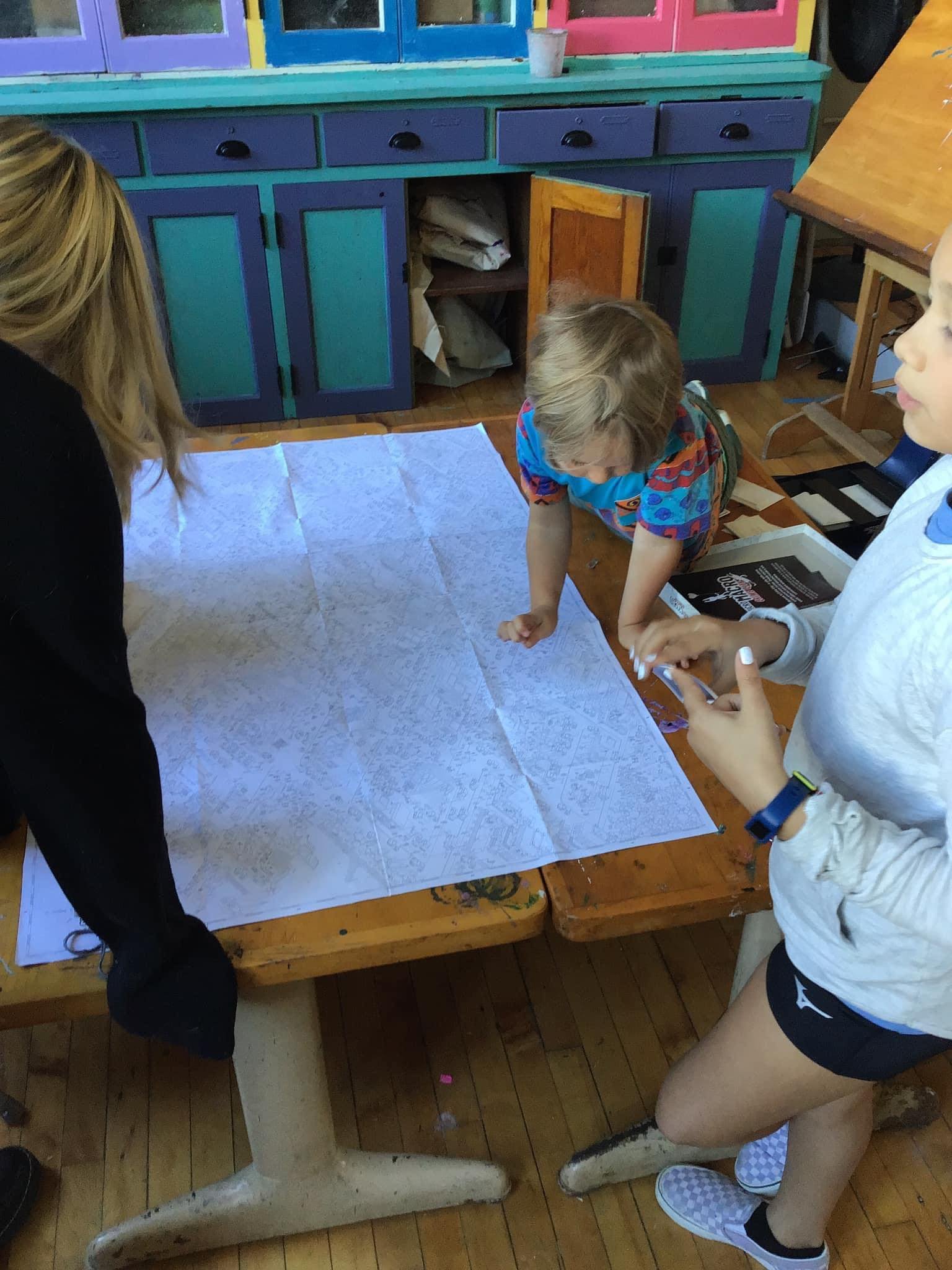
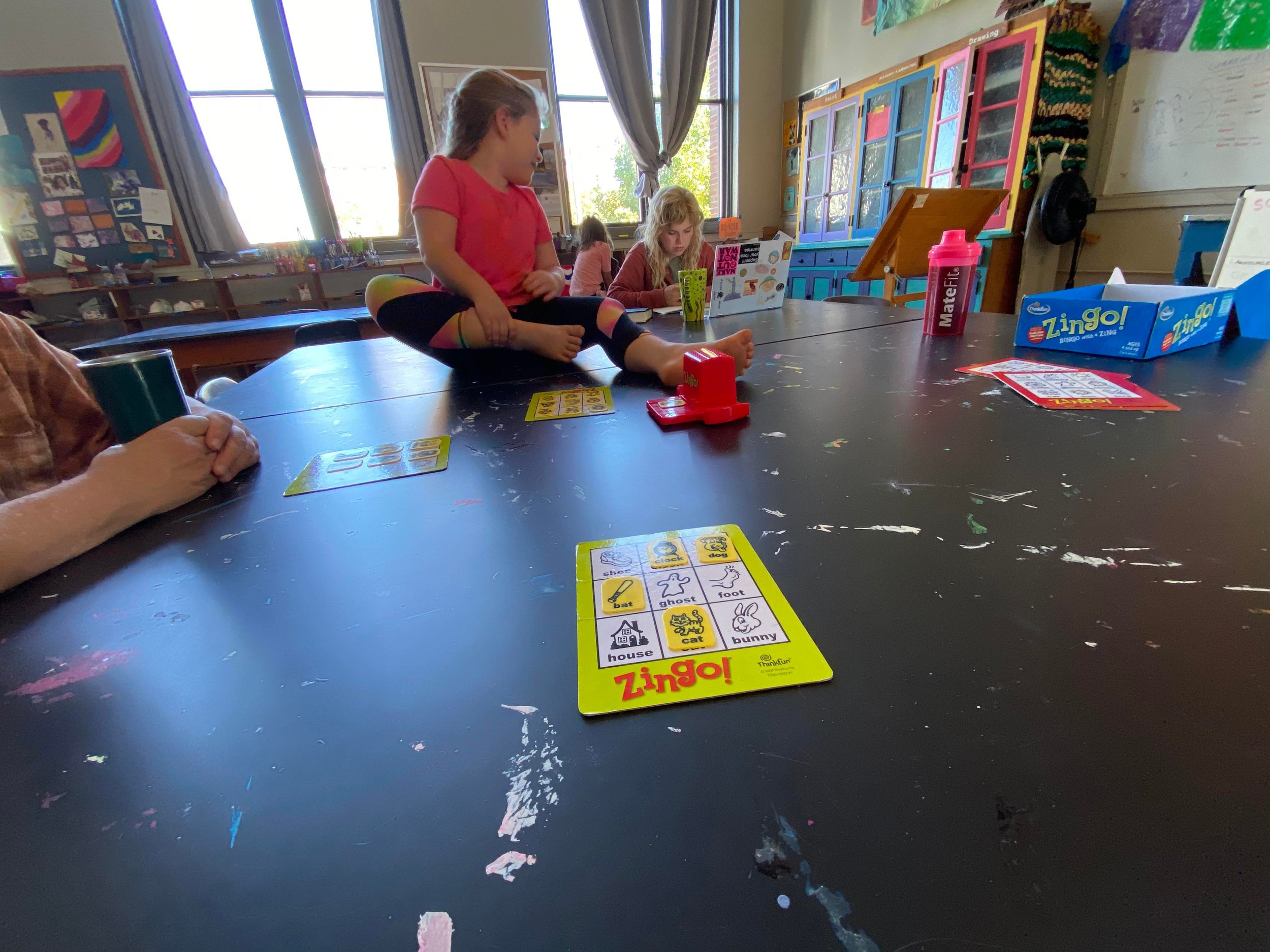
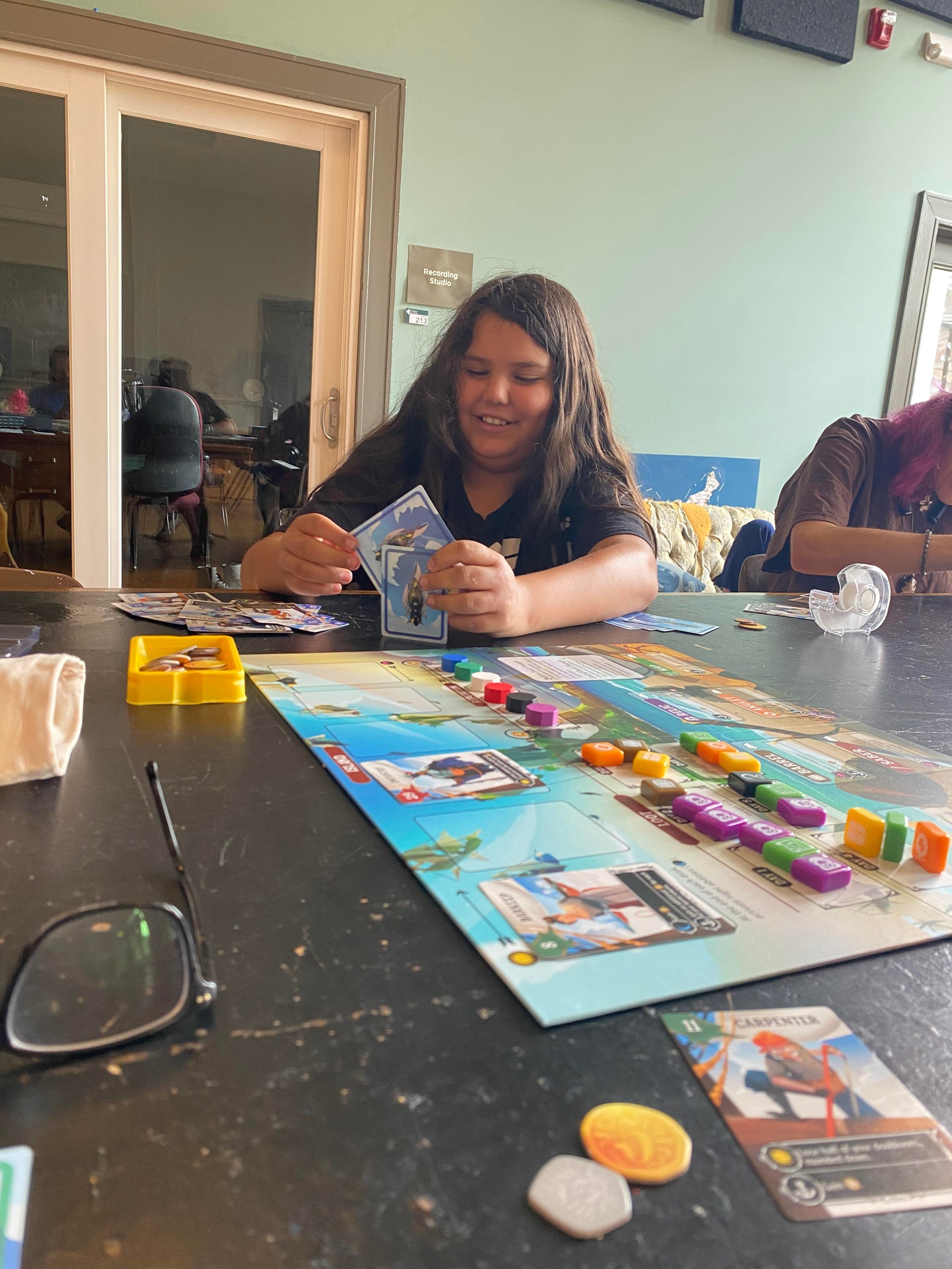
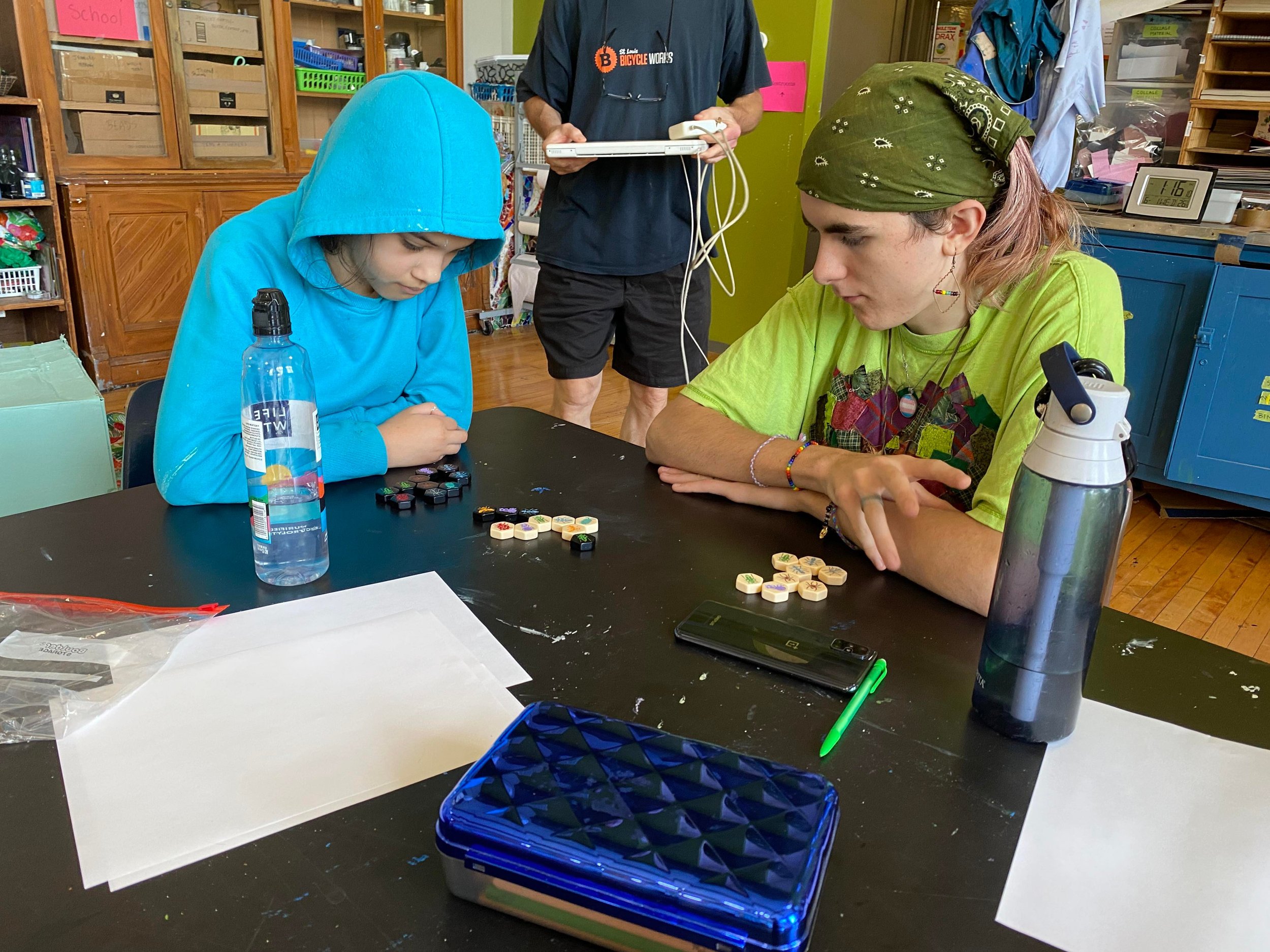
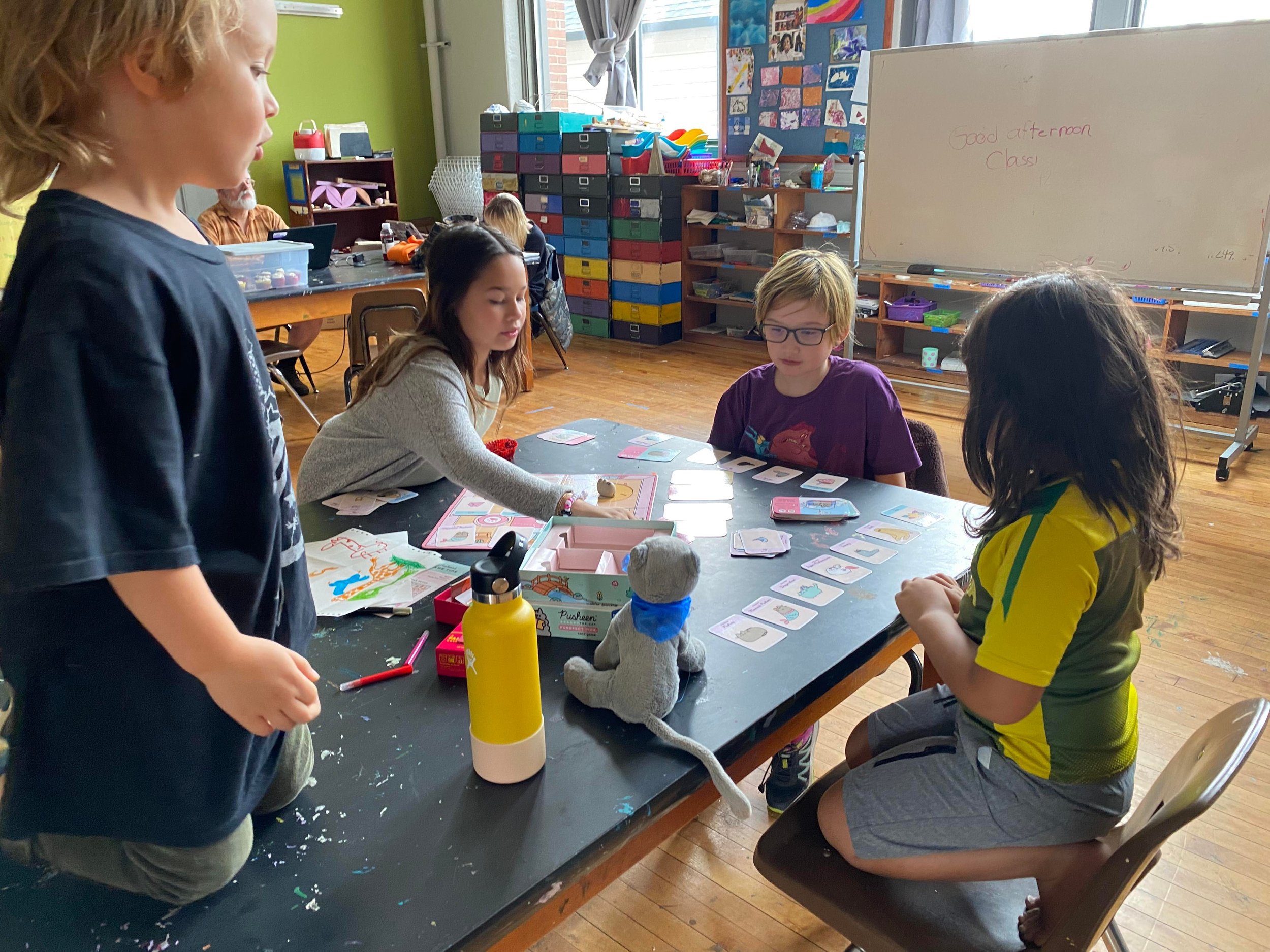
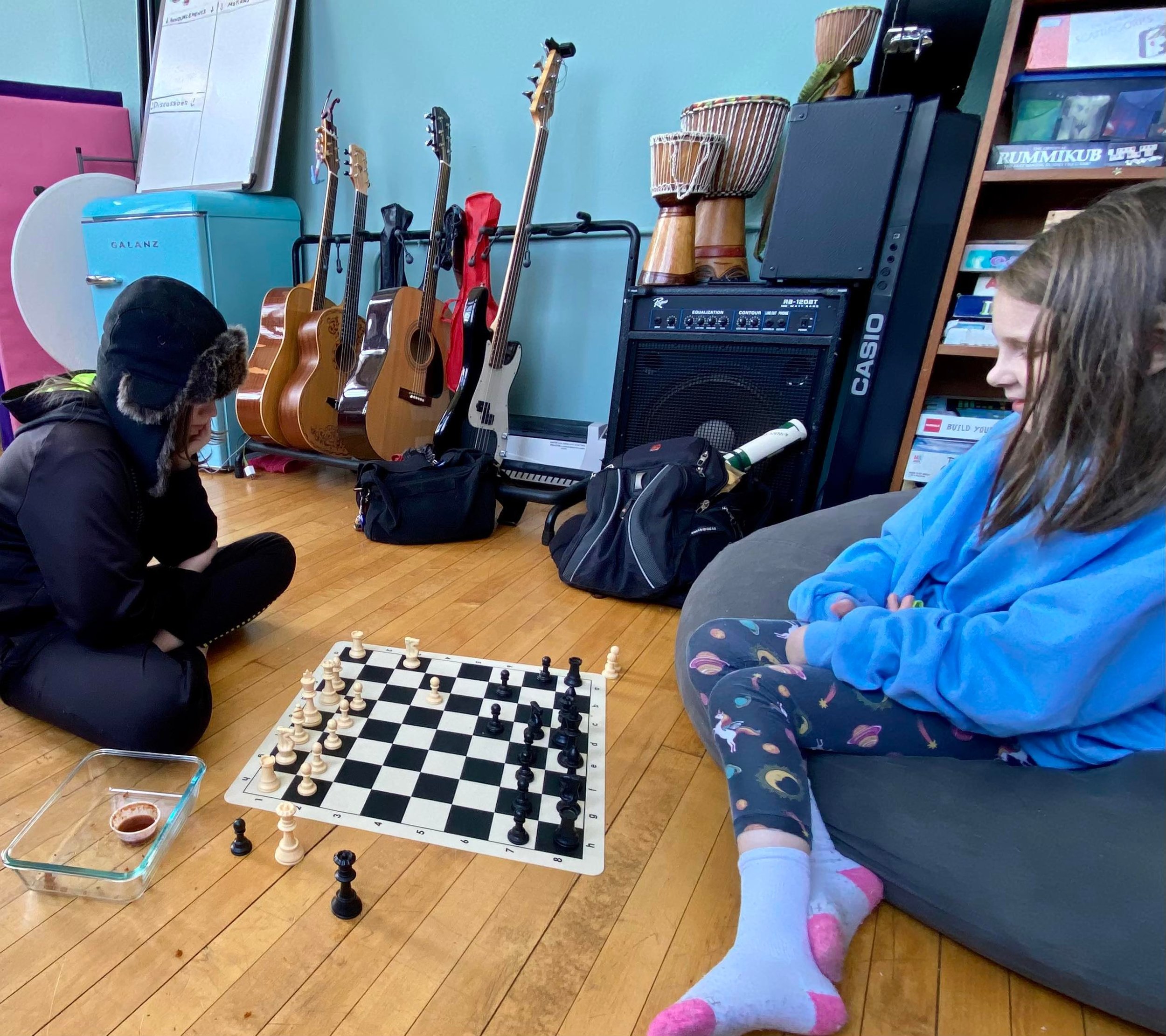
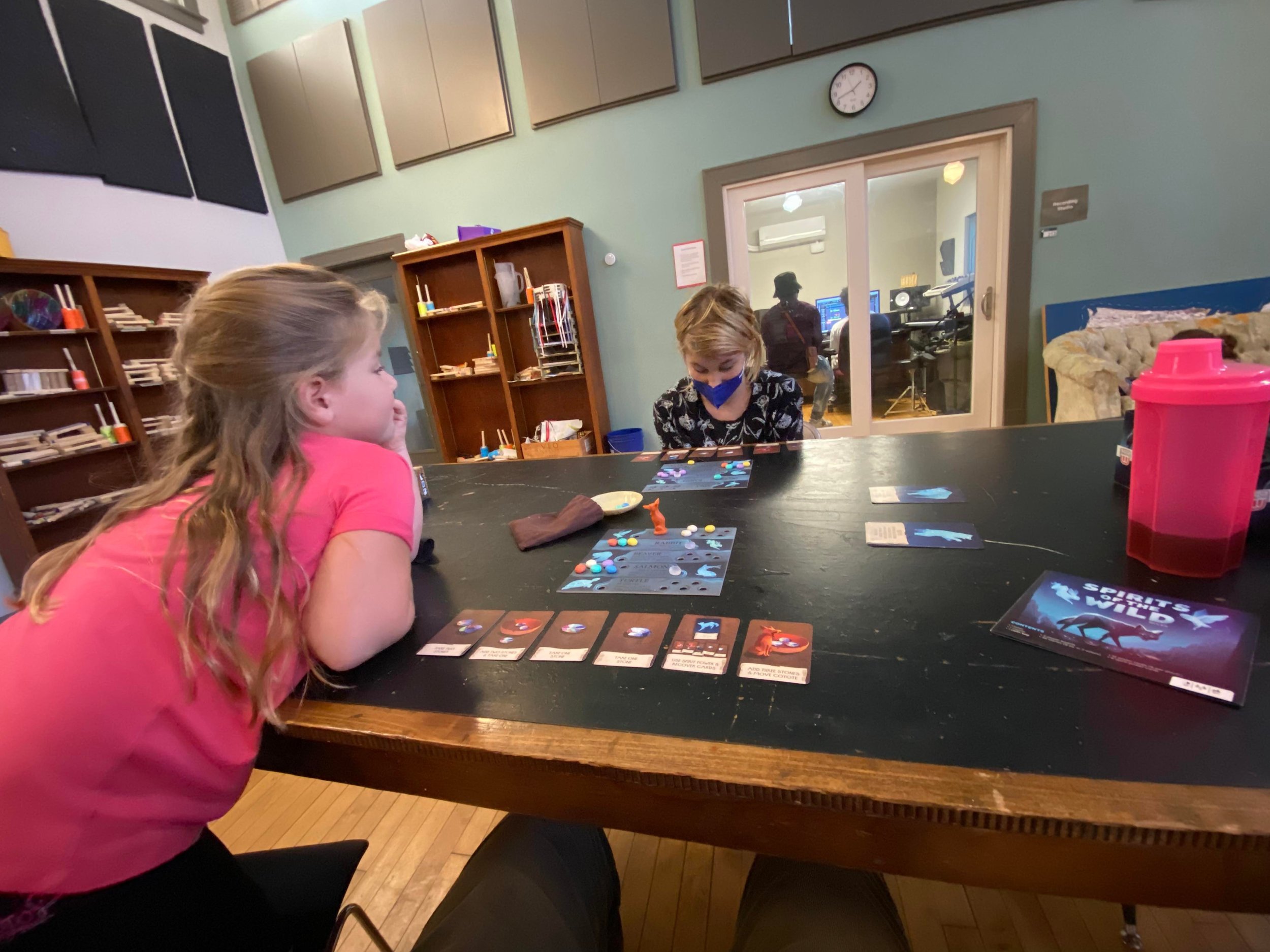
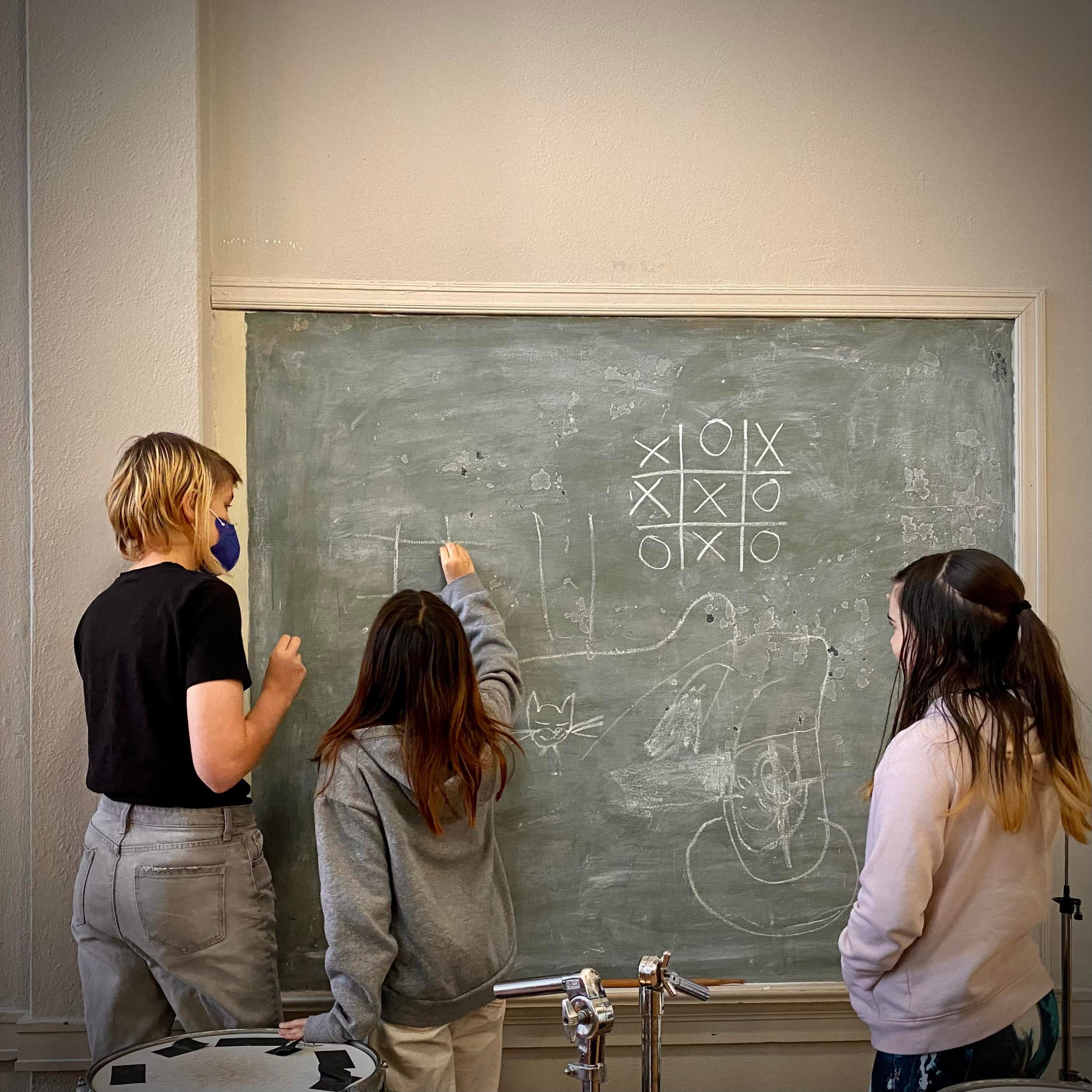
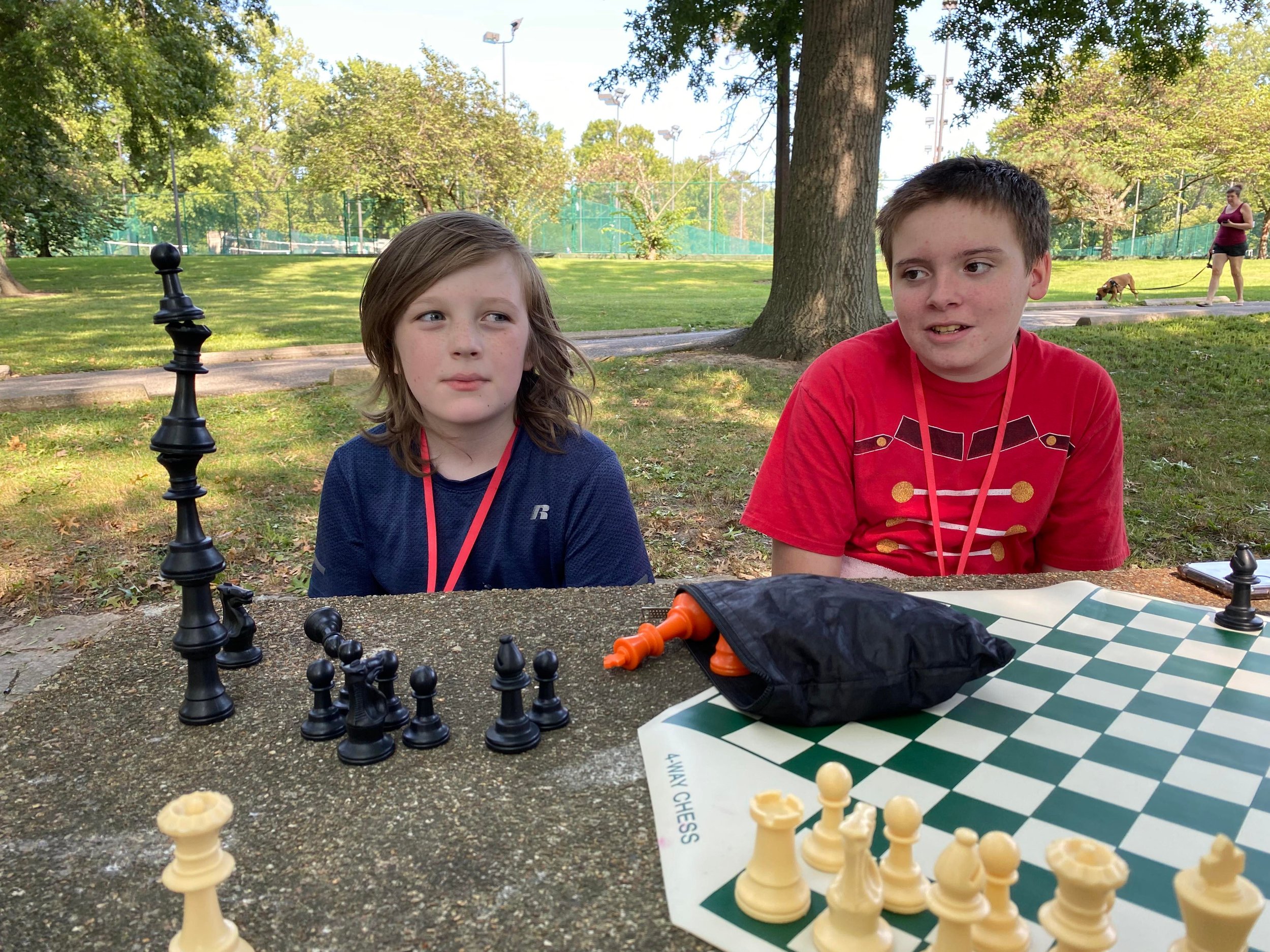
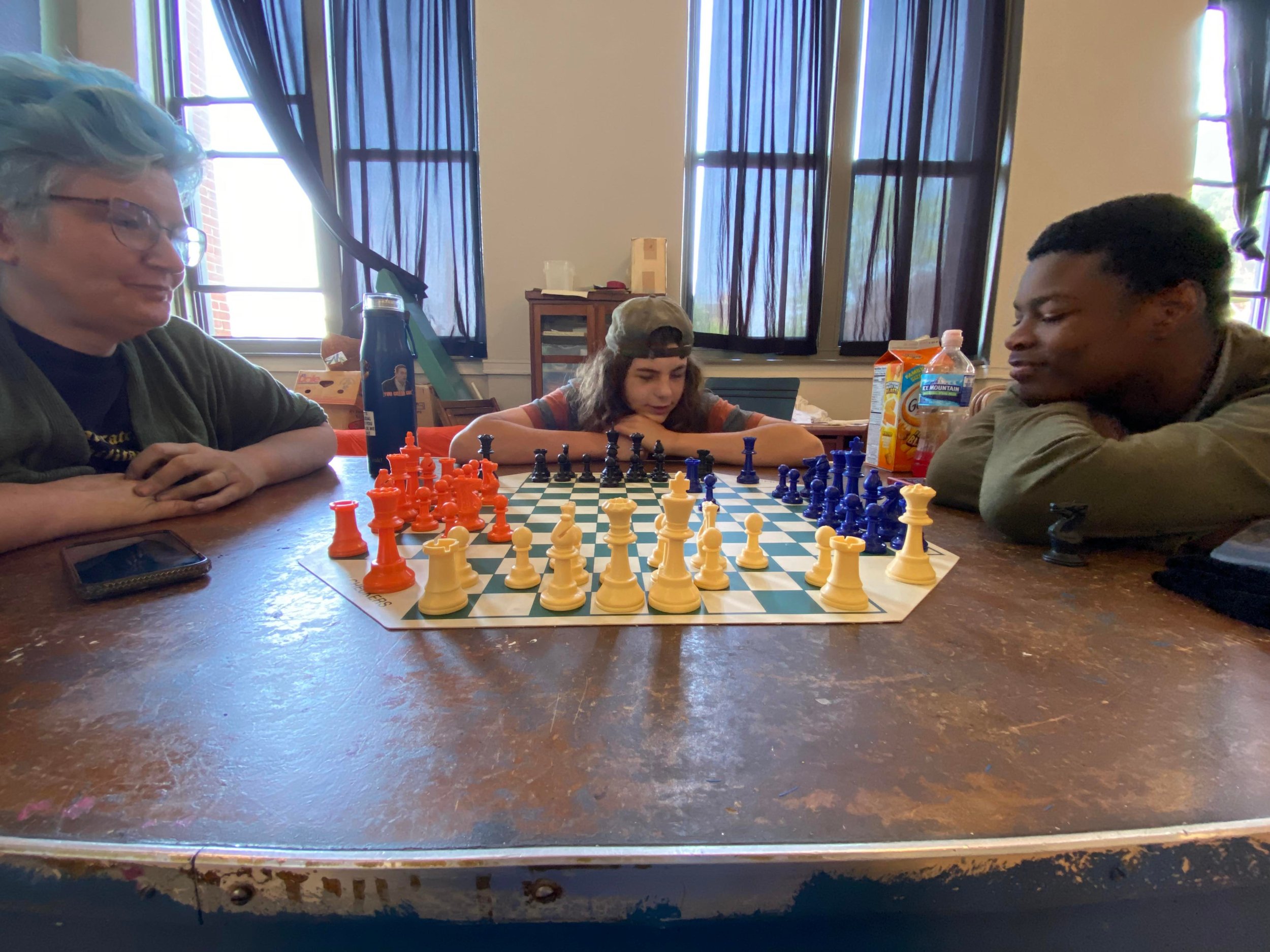
If you visit Saint Louis Sudbury School during a school day, you might see people playing board games! We asked Saint Louis Sudbury School Volunteer and Board Member William about game playing, creating games, learning during game play, the social emotional benefits, and more.
What kinds of board games or games are often played at Sudbury?
Some of the most common ones are Apples to Apples, Go Fish, Uno, Banagrams, Fake Artist Goes to New York, Codenames and Love Letter. Another popular classic is Chess and its variant Four-Player Chess. I sometimes bring heavier games, such as Catan or Pandemic, but we don't always have time to play them.
Who suggests to play them?
Mostly students and volunteers. I usually bring the Four-Player Chess board with its extra pieces and there are always people willing to play.
Do you or other Sudbury community members make up your own games?
Phoebe has many games she designed herself: an abstract game called Barricade, with its unique triangular board, a cooperative storytelling game called Scribble where the students practice reading and writing, and Codenames Junior a modified version of the popular word game more suitable for younger children. As for the students, Sorin designed their own board game called Iron Tentacle, where groups of octopuses have to run a kitchen.
How does playing board games help students learn?
Phoebe's game Scribble was designed to assist with written language skills. At the end of it each player will have produced around two pages of text. Other than that, when I teach probability and combinatorics in my Math classes I use a lot of examples from games. The students feel much more engaged that way since they see a direct application of what they just learned. There are countless studies that show how learning is more effective when we enjoy what we are doing. The content is just as important as the delivery. Peter Gray explains in his book Free to Learn that this is because of how humans are hardwired to learn through play. This is how we learned how to hunt and survive for thousands of years, through play and games when we were young.
Do you see social emotional development happening when playing board games with students? Could you give some examples?
Definitely. Every game is essentially a very light social contract. There's nothing to prevent you from breaking or bending the rules except the consequences of upsetting the other players, and some students definitely test how far they can go. I think this is essential to healthy emotional development, especially because all behaviors are happening in person, face-to-face. There's no hiding behind the anonymity of the internet. It's a great opportunity for the students to learn how to navigate these situations and emotions by themselves, which is something that is integral to the Sudbury model.
What are some of your favorite board games to play at Sudbury?
I always enjoy Four-Player Chess, especially the team variant, although the chaotic free-for-all variant seems to be more popular. Cascadia is another game that I love to bring out since there are a lot of interesting math questions you can ask, and Love Letter is always fun since it mixes deduction, probability, a bit of luck and a lot of direct conflict in a light hearted way.
Anything else you would like to share?
Games have been influencing the development of Mathematics for centuries. From the invention of the rules of probability by Fermat and Pascal in order to analyse "games of chance," to the recent uses of neural-networks and artificial intelligence in modern Chess engines. I think it's great that games are such an integral part of Sudbury. When we look back at our school years, it's not the content of classes taught by the most qualified and sternest teachers that we remember, it's the ones where we were engaged, the ones where we connected with those around us, the ones where we had the most fun.
Q&A with Student: Nyla
We recently talked with Saint Louis Sudbury School student Nyla! She is 10 years old and has attended public schools in St. Louis before coming to Sudbury. Nyla loves hanging out with friends and traveling!
How do you describe Saint Louis Sudbury School to your friends or family who aren’t familiar with the school?
It’s self-directed education with a different way of learning than public school.
What’s one of your favorite things about Sudbury?
The freedom
What do you find challenging about the Sudbury experience?
The amount of students. I want to have a lot more.
Students of all ages can freely mix at Sudbury. What do you like about that?
I think it’s great.
What do you think of Sudbury’s Judicial Committee?
I think it’s a great resource for when kids have troubles, aren’t getting along, or have a hard time setting boundaries. It helps students learn other ways of dealing with conflict.
A lot of people talk about how Sudbury model schools help develop life skills. What are some life skills you’ve practiced at Saint Louis Sudbury School?
Learning how to take care of younger kids and putting my opinion in a conversation.
Dream about Saint Louis Sudbury School 10 years from now. What does it look like to you?
Way more students, of all ages. A space that fits us more or our own building. Everyday is packed with fun classes.
A Walk in the Neighborhood
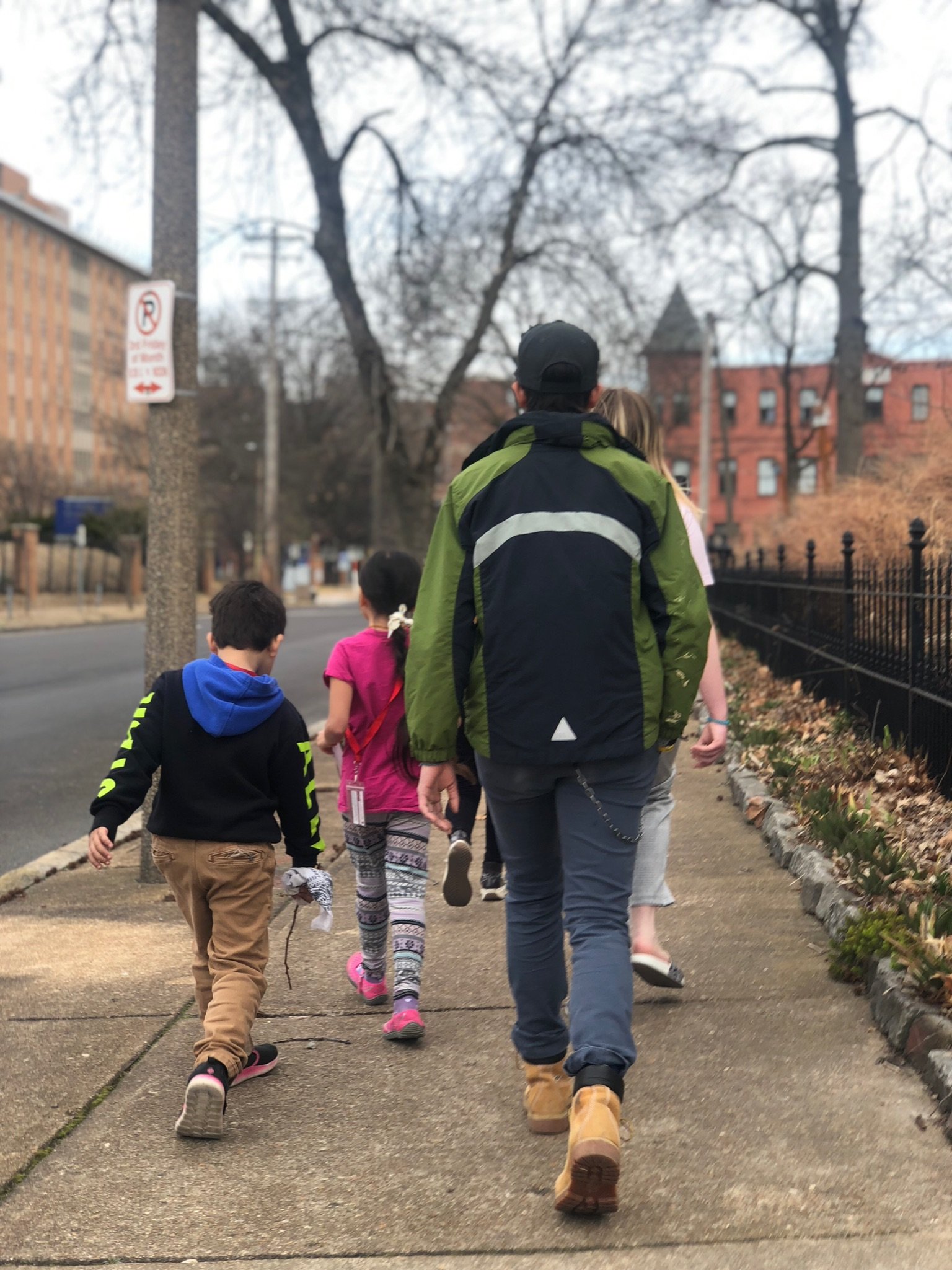
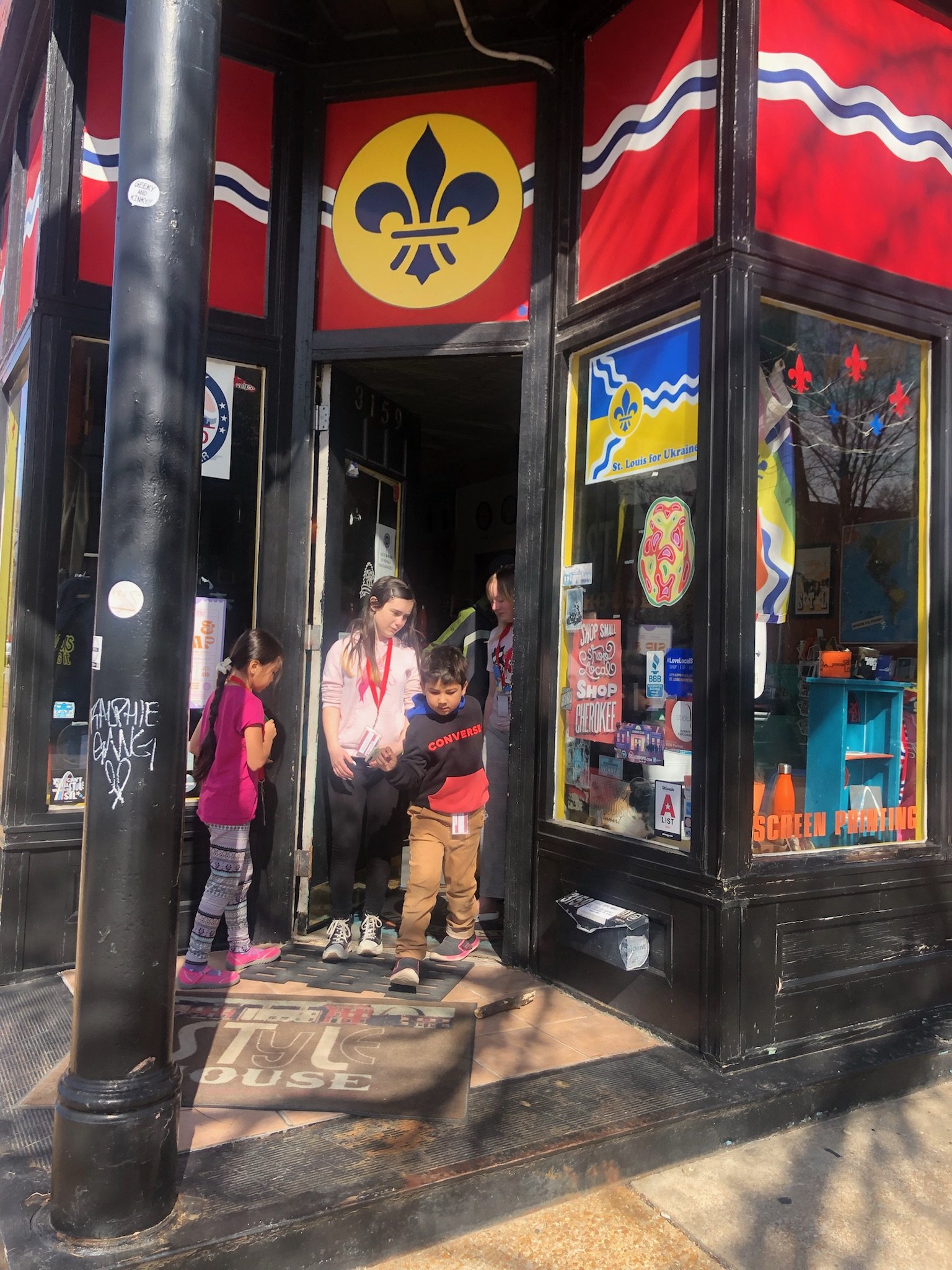
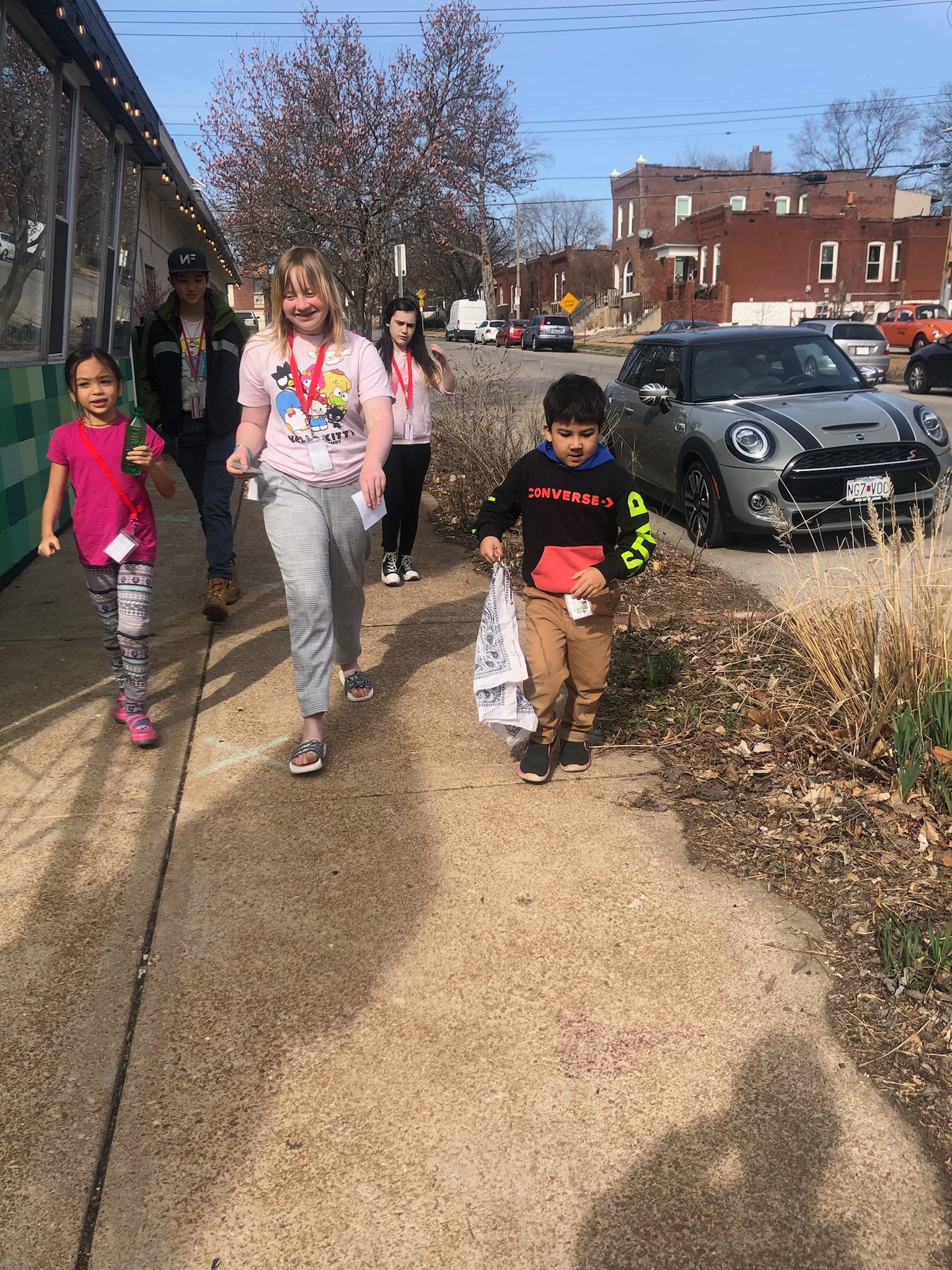
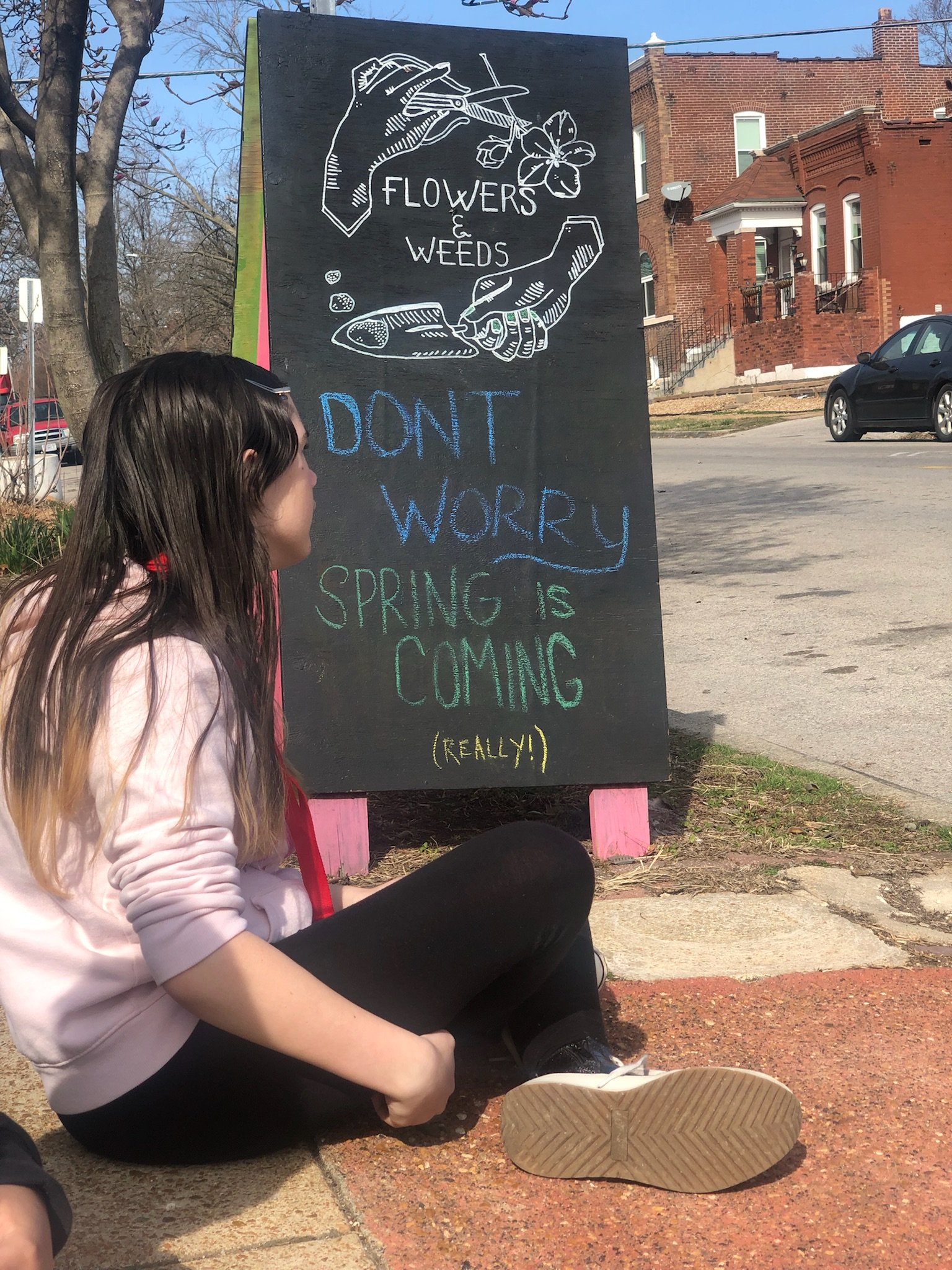
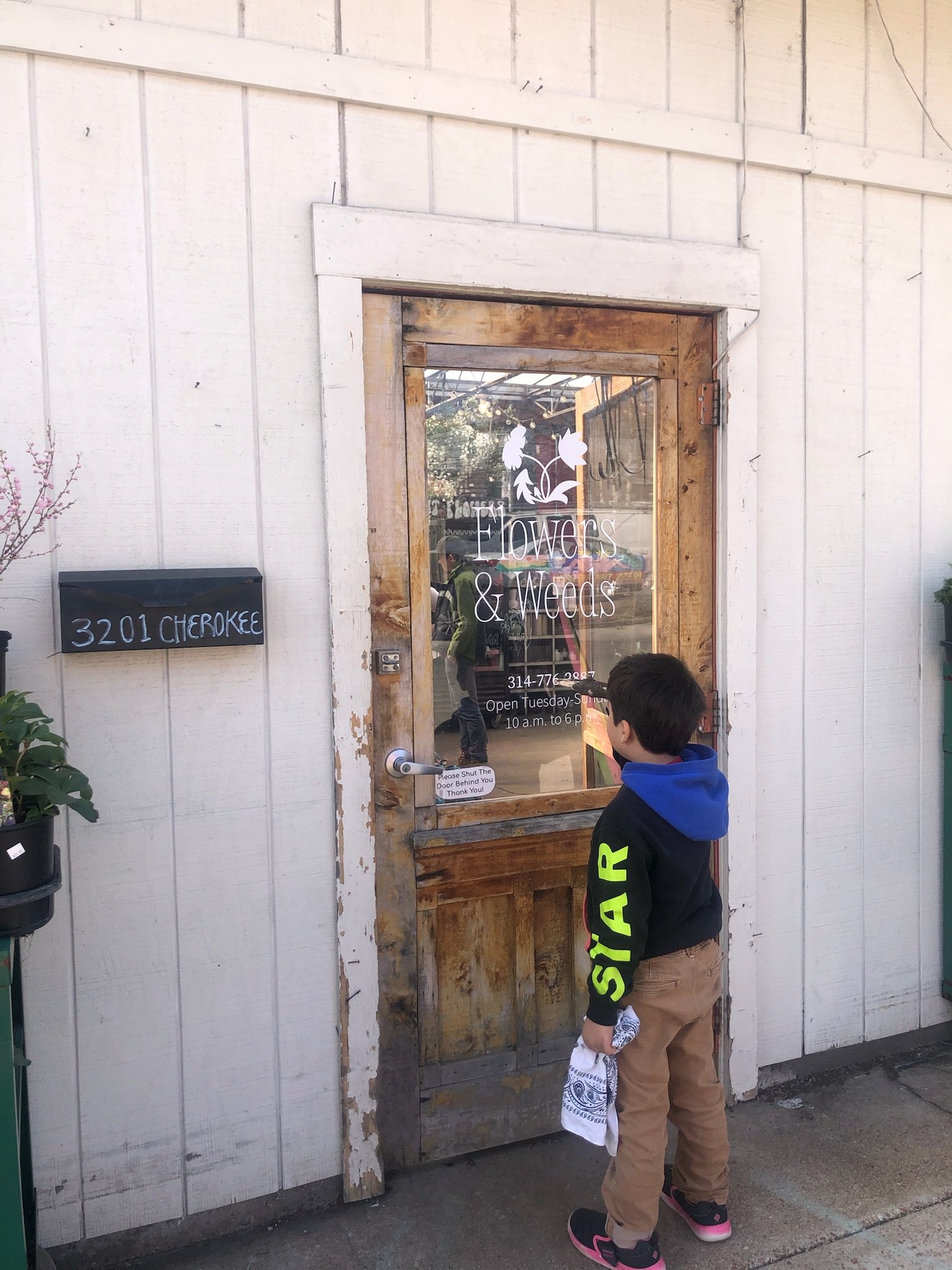
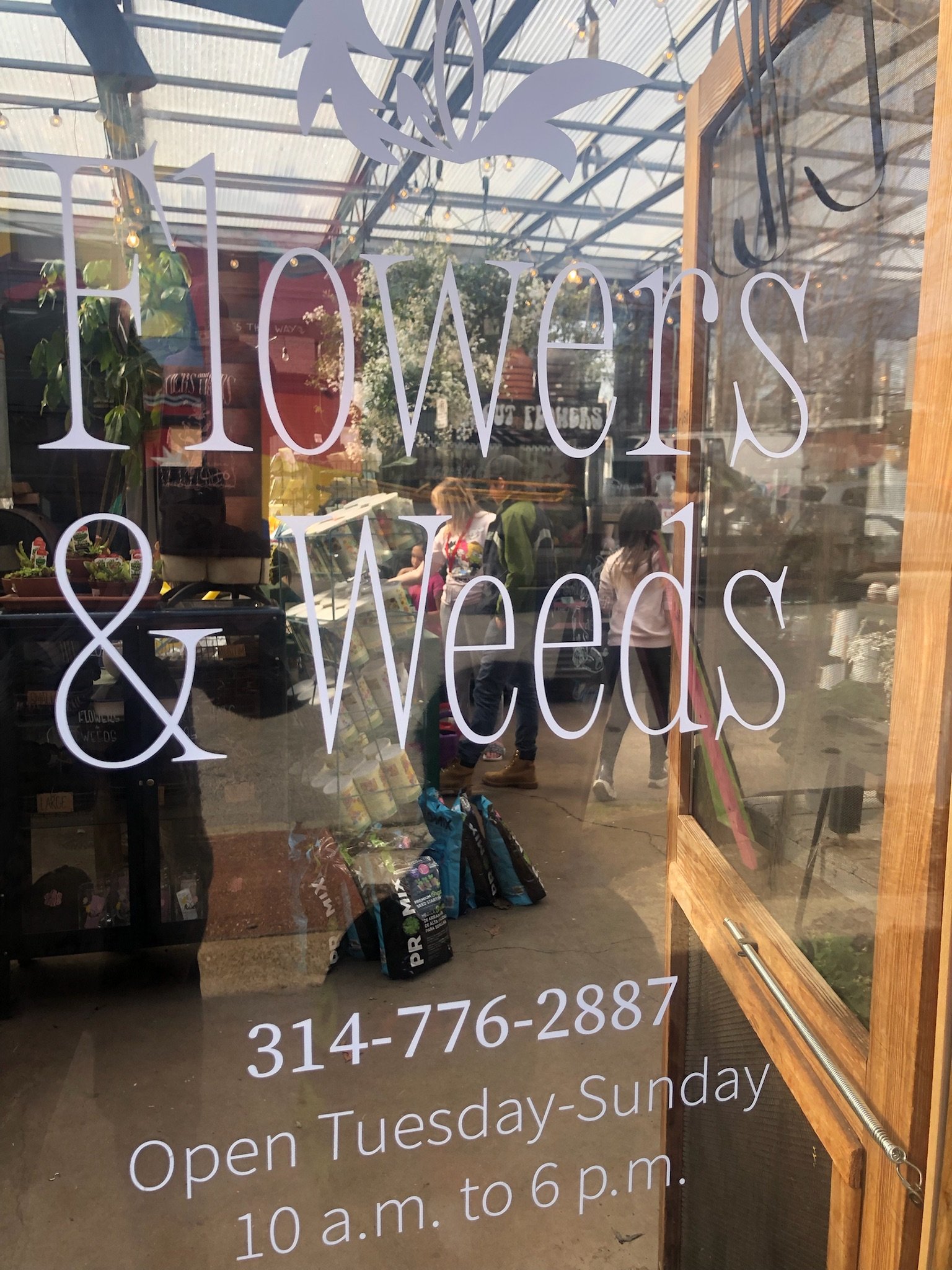
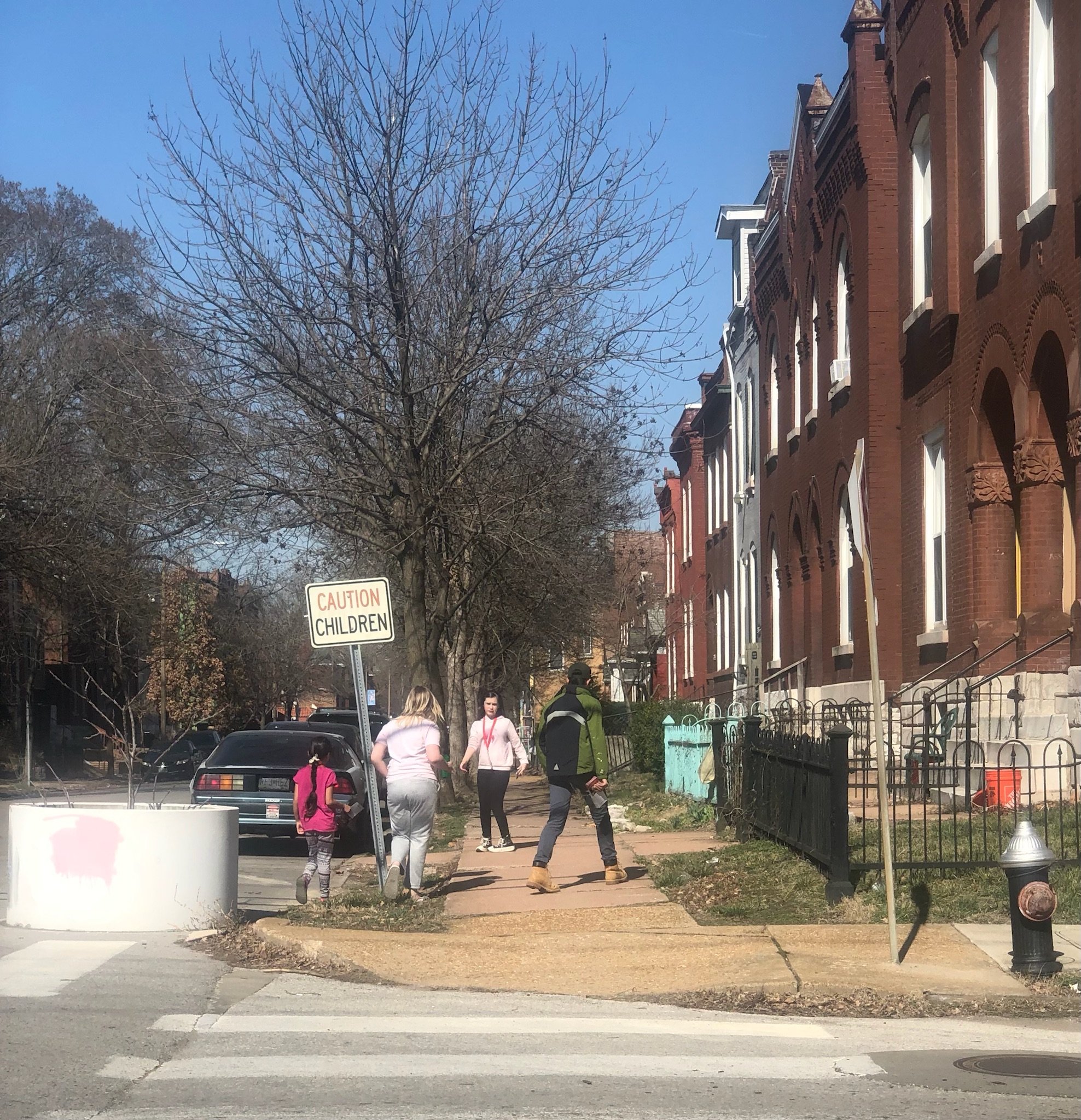
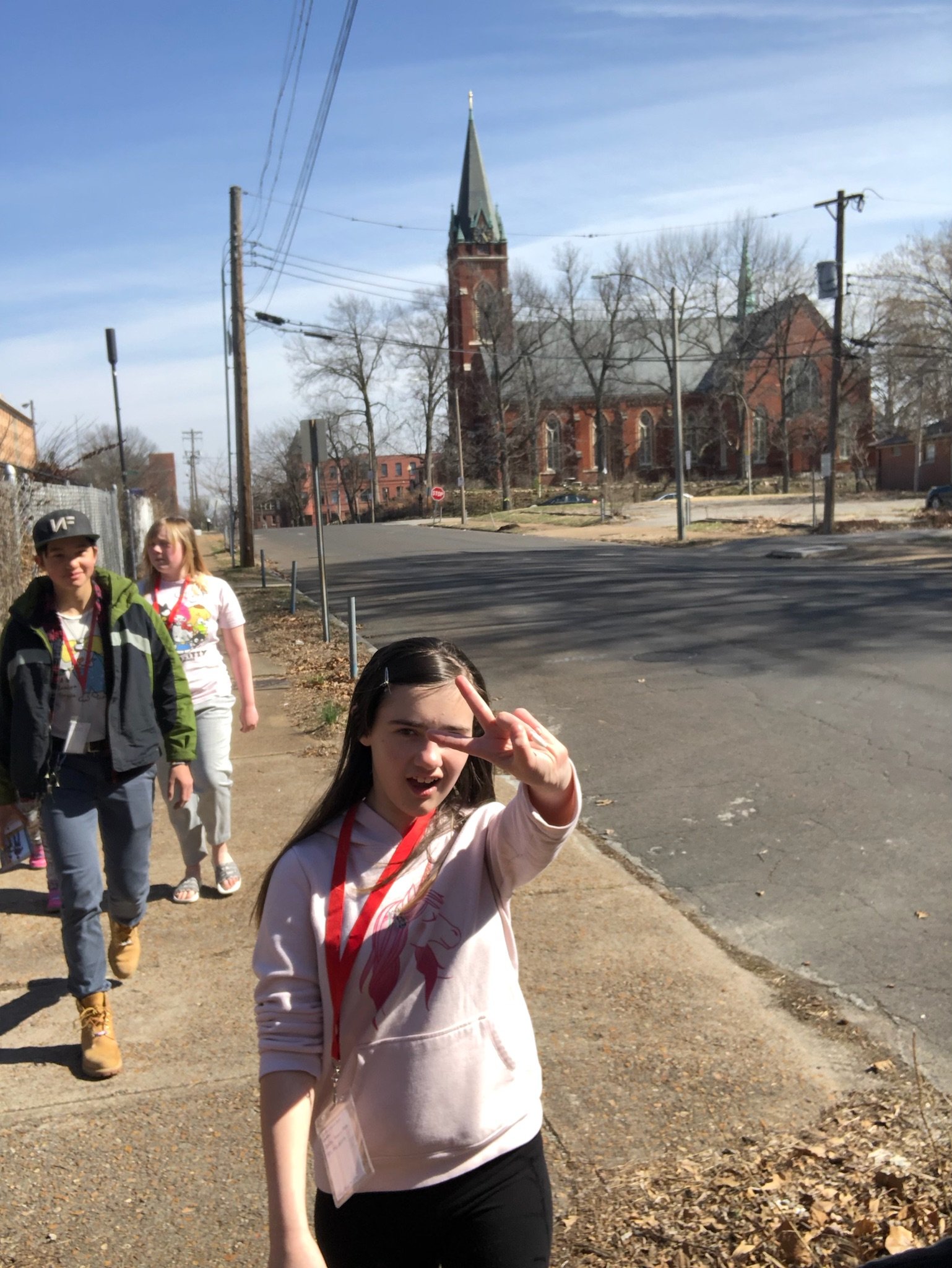
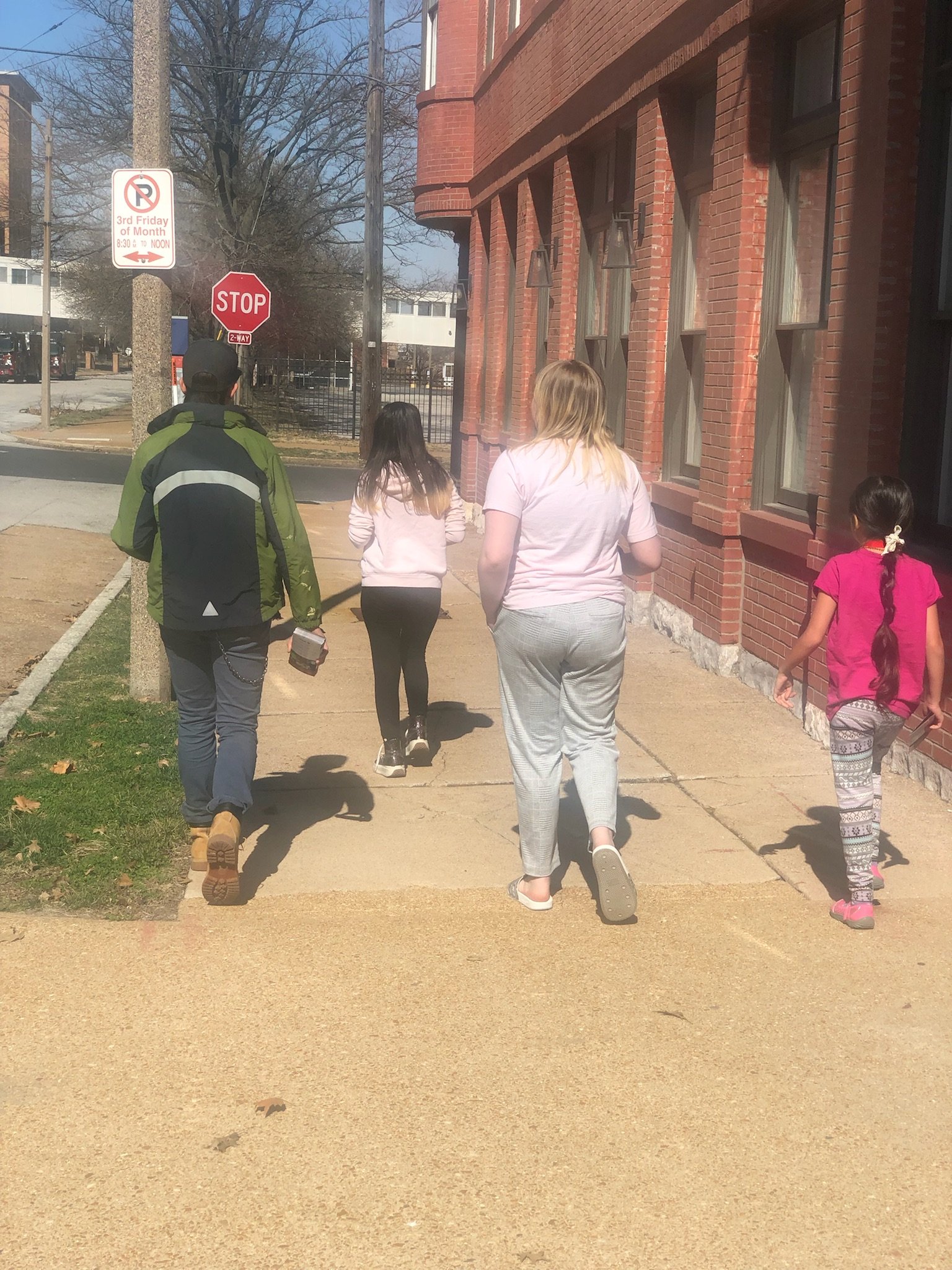
Saint Louis Sudbury School students recently took a walk to nearby Cherokee Street in St. Louis! After checking in with student-led Safety Committee, kids walked several blocks to see our friends at STL Style who generously offered to share information about our school with their customers, stopped by the magical shop Flowers & Weeds where a student bought an air plant to share with the school, and explored the area. Our group enjoyed practicing life skills—communication, patience, sharing, discovery, self-awareness, caring for others, and being okay with the unknown.
